#cause i don't think that we as a society talk about the fact that the b stage was GONNA BE A HEART.
Text
lover the album is actually so good and the lover era was so much fun and if you get it you get it if you don't you don't
#the pink! the colours! the glitter!!!!!!#my dream is that she releases the concept art and costume designs for lover fest one day#cause i don't think that we as a society talk about the fact that the b stage was GONNA BE A HEART.#dee speaks#lover#taylor swift lover#ts lover#lover album
427 notes
·
View notes
Text
Fujimoto has never talked so much about love as in this chapter
This chapter is incredible, not only for the multitude of answers it offers but also for the beauty of its writing on first reading alone.
It opens with a man who appeared in chapter 101 of CSM, as passers-by passively walked past him, this stranger was actually right: humans, one of whose major causes of death are demons, are leading to a cold war (ironic to talk about a Cold War for a manga set in the 90s)

But it's as if the whole of society refuses to notice, that everyone hides behind Chainsaw Man and consumes all these derivative products like lucky charms. Chainsaw Man embodies a demonic anomaly, a demon at the service of the people who make them forget this war.
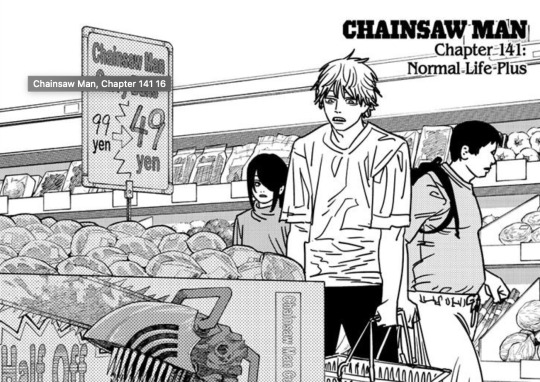
And that's exactly why Yoru has a grudge against him. Chainsaw Man is an instrument of peace, wielded in times of peace and sacrificed in times of war. Chainsaw Man is there to make us forget the conflicts or become the scapegoat, in either case, he is there to make us forget the war in which humanity is trapped.

A machine into which all hopes are projected, cries of suffering directed, whose childlike quality is seen only by the predators who exploit him constantly.

What we need to see in this dialogue between Nayuta and Fumiko is a struggle for domination. As we have seen, Fumiko is someone who, despite her aggressions, drowns them in a constantly contradictory protection: she wants to protect a child, but moleste Denji, plays a game in which she places him as older in order to hide her predation, and has saviour syndrome.
Fumiko thinks she's easily understood the nature of weapons, she's sensitive to Quanxi's bodily sacrifices and only repeats to the one she's abusing like an unrestrained fan of a child. Fumiko is the symbol that even when she belongs to the same camp as those she intends to protect, she still can't understand them.


She thinks it's either Nayuta who finds humans weak, or the fact that Barem supports Denji's demonic quality, that they are threats to his well-being when they are the ones who know him best. This is normal, because the strategy of public hunters is to bank on Denji's human side, but this strategy is not enough.
In chapters 136 and 137, Denji is mistreated when he's playing as a human being, getting into fights at school, being treated badly by his teachers, molested when he was thinking about a date at the cinema, and the closer he gets to normality, the more he suffers.
She symbolises not only Denji's sexual trauma, but also the paradox of the hunter system: a system that intends to offer Denji a family framework, but which is not only failing but also traumatising.

Nayuta says she wouldn't kill humans because they're weak compared to demons anyway. It would be as boring as killing ants! It's a continuation of Makima's point that the demon of control isn't interested in things that can be mobilised or easily controlled, it's powerful demons like Pochita that she wouldn't be able to control. Because the only way to establish a link for this demon is to find a demon as powerful as her, of her rank. Nayuta's superiority complex is always balanced against Denji's inferiority complex.

While the demon of control is only interested in demons, the demon who was martyred by humans cannot conceive of himself without them, but we'll come back to that later.
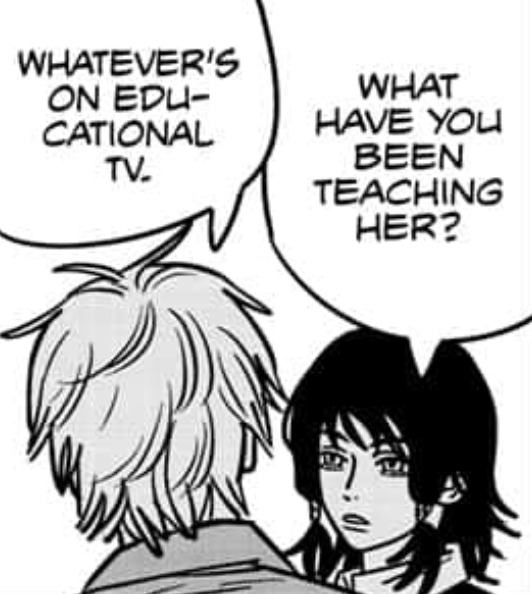
I just want to point something out: isn't it paradoxical to reproach Denji for the education he gives Nayuta when Fumiko is supposed to regard him, as she claims, as a child? Once again, Fumiko is in constant contradiction, protecting by controlling and attacking, conceiving of a child as an adult, she is the hold over a child she can't help but see as a weapon while vouching for his condition.

What's more, Fumiko's thinking is purely human, not universal like Denji and Nayuta. For them, feeding the dogs and their cat is a mission of the utmost necessity, it's like acting to protect one's family, whereas Fumiko refutes this.

Denji has been considered a dog for part of his life, and has bonded and merged with a demon in the shape of a dog, which is the first form of love he received: it was not humans who first gave Denji love, but animals. In the same way, the demon of control likes to form a relationship with dogs who take pleasure in their domestication, either as a form of denunciation or as a clearly established hierarchy.

Fumiko proves that human sensitivity only stops at their peers, while the rarer demonic sensitivity is more universal and intense, whether it's treating animals as precious beings or forgiving unforgivable acts like Denji's continued love for Makima.

The fact that Denji and Nayuta appear to have no moral barriers is what allows them not to be prisoners of their own, and to conceive of love more extensively, whether it be harmful or inter-species.
All this just goes to prove Barem's point that, as a weapon, he has a very good understanding of the different species and what they have in common: death is what binds us together.

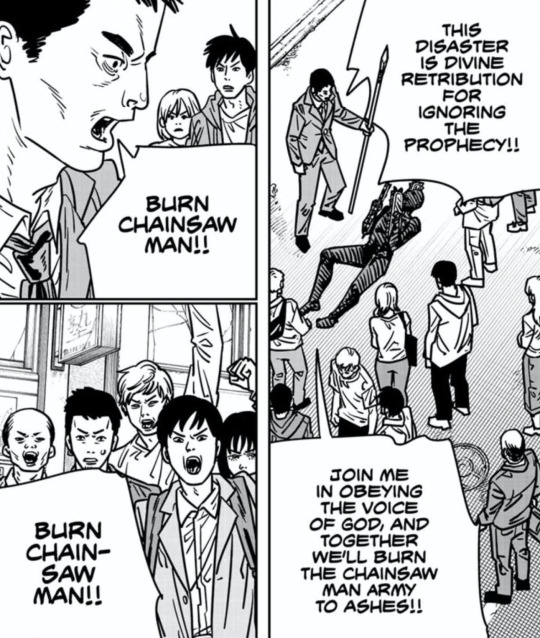
When humans no longer find interest in a figure, it is destruction that attracts them. In other words, it's intrinsic to them. Even when they have been spared the demon of fire, they intend to spread it. Isn't it ironic, then, that Fumiko intends to protect two demons at the expense of their animals? Humans only see the world in terms of hierarchy, whereas demons and animals recognise that there is more to it than just a food chain.

Nayuta's emphasis on the exhilaration that comes from abusing and killing demons is spot on. In chapter 137, Denji had fun beating up all those men, even concluding that "this" normal life wasn't so bad. Why was that? Because it's the daily life of a demon.
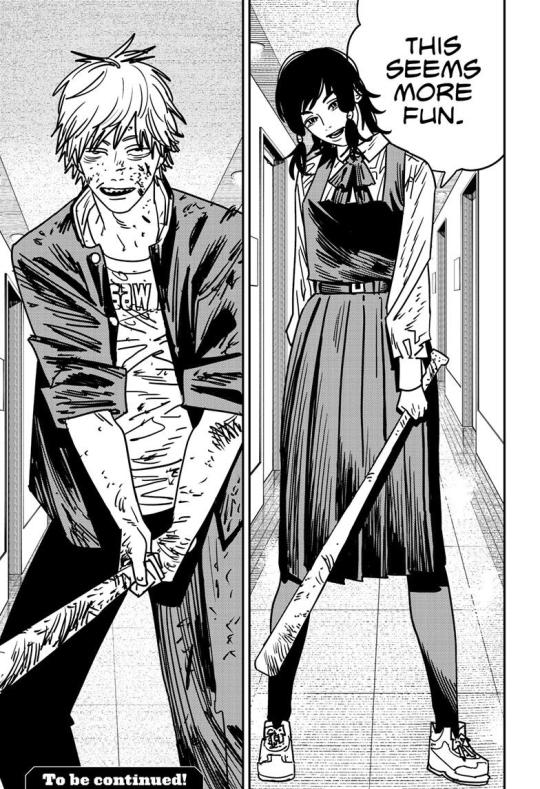
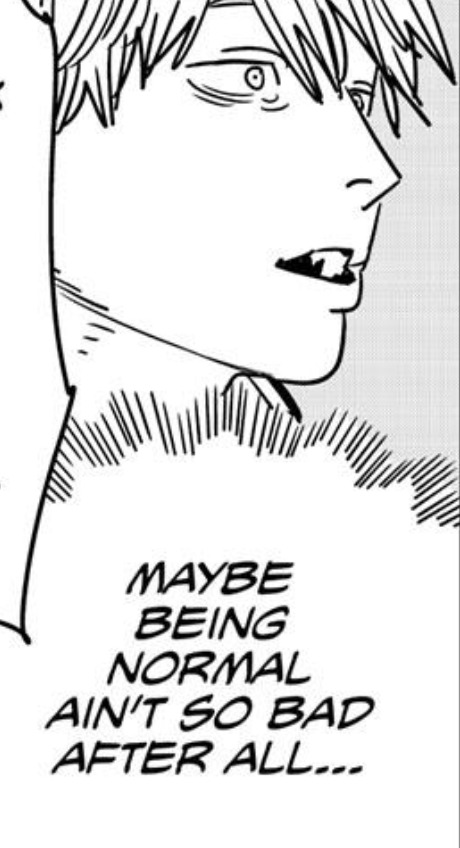
Denji, who belongs to both camps, has human needs just as much as he has demonic needs, so Nayuta has a point. But just as living solely as a human doesn't satisfy Denji, acting solely as a demon doesn't work any better.
Denji works through the concrete, through sensations, and what he materialises through his senses, the fact being that he's had at least one kiss without any major damage with a human his own age.

Just a harmless touch is what allows Denji to connect with humanity as a whole, to be sensitive to their plight, even though he has no morals and takes pleasure in human suffering.
It wasn't until Denji struck up a relationship with Aki and Power for the first time that he was able to feel human and stop feeling like an animal. We are empathetic to the fate of those who resemble us, Denji is a universal being, animal, human and demon, he is the one who brings these different worlds together. Barem is right: death is what binds species together. But Pochita and Denji are the symbol that love can also be a common denominator.
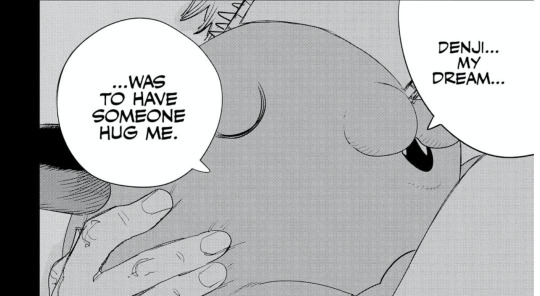
The fact that he thinks of Asa is symbolic because, without knowing it, she is the one who understood the plurality of species in Denji. She began by dehumanising him, Denji's animal phase, placing him below the cat (proof that she too places animals before men), then she had budding feelings for Denji before being disturbed by Chainsaw Man.

That's why Chapter 101 is so important to understanding this chapter: because in it, Asa makes friends with both humans and demons, getting to know Yuko just as she does Yoru. She is not outraged by the idea of killing, as Yoru asks her to do, having put aside her human nature and accepted the world as it is, which is ruled by death.

But she is no fatalist, and in the face of a demon, she protects Yuko, continuing to love despite her mistakes "as long as her heart is in the right place". What matters is not so much our actions as the cursor through which we place ourselves to apprehend the world.
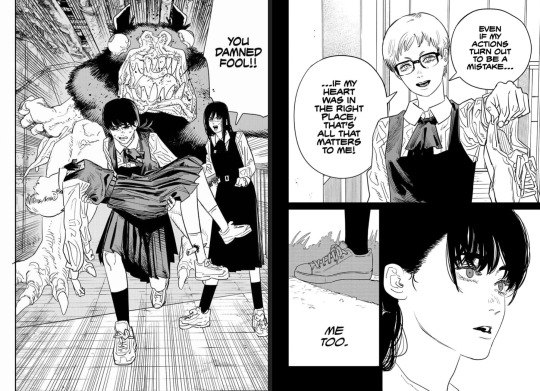
Relationships are full of mistakes, imperfections, misunderstandings and a game of dominance. Denji doesn't realise it, but the one who kissed him wasn't Asa but Yoru, and it was for a bad purpose: to turn him into a weapon. Paradoxically, in wanting to make Denji a weapon, Yoru conceived him as he was, a hybrid being, a weapon. It was the first kiss in which he was seen for what he was.


But not only that, just as Asa loves the different natures of the multi-species being that is Denji, so Denji loves Asa's dual nature, what holds him together is as much the memory of the human in the aquarium as the physical contact with the demon inside her.
While Asa, in her desire to protect Denji, was distancing herself from him, hurting him and making him doubt himself, it was paradoxically the demon, with evil intentions, who gave him some peace of mind.
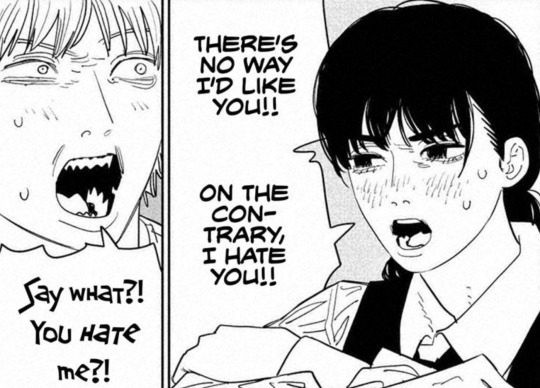
The chapter is called Devil's choice, an expression which means that we only have two choices, that we can't have everything. In this case, that would mean choosing a species, a side. But what Asa and Denji still represent in this Shakespearean symbolism is not belonging to any side, but loving in a universal way.
The rejection of men has opened up other perspectives for both of them, be it the animal or the demonic connection.
Once again, the answer lies in plurality, in what begins with two: Asa and Denji decide, on the contrary, to have it all, there is no Devil's choice.


By deciding to bond with animals rather than humans when they lost their parents, Asa and Denji forged a destiny guided by love without barriers.
Their bad experiences - sexual harassment for Denji and bullying at school for Asa - at the hands of adults have naturally created a distrust of humanity that is rekindled by contact between the two of them.
It's when Denji and Asa come together that they regain hope, because they are the definition of loving each other fully.
Those who stand in the way of this universal love are the public hunters who avoid this natural crossing.
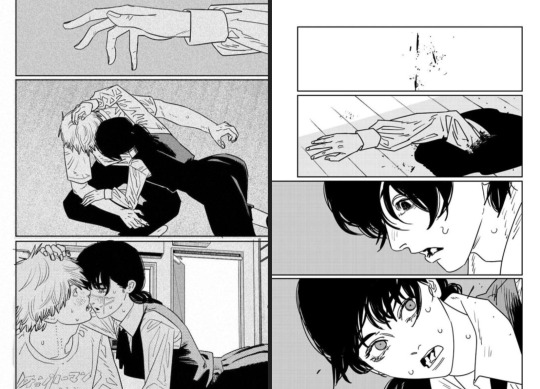
The public hunters are there precisely to fuel the fight against humans and demons, the link they carry is not love but the other common denominator, death, destruction. Even if it means crossing the moral barrier to exploit children with Yoshida by forcing them to harm other children like Asa, Fumiko being once again the symbol of this danger.
Denji has both human and demonic needs, so he's destined to love Asa because she's both human and harbours a demon with a thirst for violence. Chainsaw Man was used to make us forget the war, but by loving the demon of war, they both unravel.
Only Chainsaw Man and the demon of war can conquer death, because love is the second common denominator that links the species.
Why? Because everyone has a heart. Even demons. Who not only have one, but become one.

#chainsaw man#csm#csm part 2#csm spoilers#csm 149#csm 148#csm 101#csm 102#csm 146#csm 142#csm 140#denji#asa mitaka#asaden#yoshida hirofumi#barem bridge#nayuta#fumiko#pochita#my thoughts
617 notes
·
View notes
Text
Neighbors
Leon Kennedy x Fem!Reader
I said I would do requests and requests you all shall get!
This one was suggested by my bsf <3 He messaged me when I complained about having no requests and offered this idea! Shout out to bestie!
Summary: You're new in the neighborhood and Leon takes quite a liking to you <3
Tw: SMUT, p in v sex, unprotected sex, dirty talk, swearing, taunting/mocking, hair pulling (Let me know if I missed anything!)
Omg, if there are any mistakes, pls don't make fun of me. I just got new nails and it's a little hard to type on my laptop ;-;
18+!! NSFW!! MDNI!! Read at your own risk!!
Enjoy! <3
❁´◡`❁❁´◡`❁❁´◡`❁❁´◡`❁❁´◡`❁❁´◡`❁❁´◡`❁❁´◡`❁
You throw the final box into the pile, wiping the sweat off your brow.
The process of moving into your new home has been a long one, but also a necessary one.
The hot sun beams down on your skin, sweat dripping from every crevice. Your muscles are weak and ache for rest. You turn around and look at your new home, a sense of pride coursing through your veins at the fact that you'd managed to complete everything on your own.
You're so deep in your feeling of accomplishment, that your hardly notice the sound of footsteps approaching you.
"Hey!" The sound of a yell catches you off guard, your shoulders jump and you turn around.
You're met with arguably the best eye-candy you've ever laid eyes on. Blonde hair and blue eyes. Perfectly framed face and a soft jaw. Kind eyes with a hint of mystery behind them, and those arms were something out of a mafia film. You wanted to take a bite out of them...
You realize your gaze had been wandering longer than society would deem friendly.
You feel your cheeks heat up and shake your head to rid of your less than neighborly thoughts.
"Hi! Sorry about that. I was really in my head I guess."
He looks at you, sheepishly smiling. "No, it was my bad, sweetheart. I didn't mean to startle you," He steps closer and offers his hand for you to shake while trying not to stare at your tits through the transparent shirt. "You must've just moved in. I live next to you. Names Leon Kennedy."
You shake his hand and tell him your name, trying to ignore the increase of your heart rate at the pet name. His smile remains through your interaction. He asks about your interests, your family, your life. And you do the same. You don't get many answers, but regardless, after a few minutes, you both feel rather close to one another.
Leon offers you dinner over at his place another day, which is an offer you can't and won't refuse.
❁
The day finally came.
You dress in a simple sundress, bringing a bowl of cookies with you as a gift.
Leon answers the door with a bright smile, welcoming you inside of his home.
His home is hardly decorated, but somehow still feels home-y. He explains that his job causes for him to leave on constant business trips, so he never really had time to decorate.
There's a type of tension in the room. It doesn't have a name, or a describable feeling, but it makes the room feel small. Causes the both of you to feel hot. Your conversations are relaxed, but seem to have some kind of unspoken meaning behind each joke.
At one point, you needed a break from the inexplicable heat.
You ask Leon if you can get something to drink from his kitchen. He, of course, says yes and leads you there, pointing to the cabinet that holds the glass cups.
Only, when you stand on your tip-toes to grab a glass, Leon's large physique is suddenly pressed against your back.
Goosebumps rise on your skin, and a small gasp leaves your lips as his lips skim along your ear.
He has you trapped against him, his arms gripping the counter on each side of your waist. You slowly sink back down onto your heels, grabbing the counter as well for support when your legs begin to feel like jelly. "Leon... What are you doing?"
His hands move away from the counter, fingers slowly tracing from your hip to your waist, where it rests as he whispers into your ear.
"I think we can both feel this... feeling between us... So why don't we stop beating around the bush and cut to the chase, sweetheart?"
❁
Everything seems to be a blur after that.
You only remember Leon's lips on yours, hands wandering and fondling anything he could get his hands on. He'd littered you with hickeys and bruises, slipping off your panties and throwing them off to who knows where.
And now, you lay bent over the arm of his couch, sundress shifted upward over your ass and Leon brutally pounding into you.
Your moans are muffled by the soft cushions of his couch, your hands gripping the fabric for dear life. Your legs have completely given up on you, lying limp and only moving to jerk every time Leon's hips hit yours.
Your hands grip the couch tighter and your pussy clenches around him as you whine out muffled praise.
The sound of skin slapping skin is borderline pornographic, the wet squelching sound only making the atmosphere so much hotter.
Leon grabs a fistful of your hair, yanking you up and pressing you back flush against his chest. "What was that, sweetheart? I didn't hear you.."
A loud whimper escapes your lips, your nails scratching the arm of the couch. "Said- Said it feels good! It feels so good, Leon!"
He laughs and you moan when he manages to hit somewhere deep inside of you. "Yeah? Feels really good, huh?" He growls and thrusts into you at a faster pace. You cry out, your legs going numb. And you would've fallen flat on your face if not for Leon's hands that grab your hips.
"Mhm! Yes!" Leon groans as your moans get higher and higher, your toes curling as he try's a new angle, this one causing him to hit that sweet spot that makes you go crazy.
A desperate sob mixed with a cry tears its way out of you. "Right there! Ah! Yes-!"
You writhe in his grip, your orgasm quickly approaching. He runs his hands over the sides of your body, gripping so hard you know you'll have bruises in the morning.
His thrusts get sloppy and erratic as he begins to grunt and growl in effort. "So pretty... You gonna cum baby? You gettin' close?"
He mocks you- actually mocks you. His words come out as though he's cooing at you, taunting you. Even though you feel like you should be offended by his tone, instead you feel even more aroused by it.
Your back arches and short, pitiful gasps leave you. "Fuck- Yes! 'm gonna c-cum, Leon! Gonna cum jus' for you-!"
You hardly finish the sentence before your release forces itself out of you. You cry out, electricity flashing though your veins, as your orgasm seeps all over Leon's dick. He somehow cums at the same time as you, heaving a deep and shameless moan.
The both of you take a moment coming down from the high, mouths hung agape, breathing shallow, and covered in sweat.
Leon finally pulls out of you, watching your body twitch while his seed leaks out of you. He glances at your face, seeing your blissed out expression. An amused smirk sits on his lips when you turn to look at him. You want to say something snappy, but your lungs haven't fully recovered. So, you settle for just flicking him off, muttering a small, 'fuck off'.
I think its safe to say, you would be seeing your new neighbor a lot more often... <3
❁´◡`❁❁´◡`❁❁´◡`❁❁´◡`❁❁´◡`❁❁´◡`❁❁´◡`❁❁´◡`❁
Omgg This took forever!! Finishing writing and proofreading at 3:20am aND I'VE BEEN WORKING ON THIS SINCE 2PM!!!!
Anywaysss, Hope y'all enjoyed!! <3
Requests are open!! <3
#leon kennedy x reader#resident evil#leon x reader#viaoverthemoon#leon kennedy x you#leon s kennedy smut#re4 leon#re4#smut#resident evil leon#leon s kennedy#leon kennedy smut#leon kennedy x y/n#leon kennedy
1K notes
·
View notes
Note
I was reading your porn addiction post, and I just wondering what you consider addiction if not some sort of disease? I also think porn addiction and stuff in that vein is fake but I also can’t think that addiction is just people choosing to be that way even though they hate it. I say this as someone who was actually addicted to substances like I feel like there was something going on there that can’t be explained by the idea that addicts just choose to be like that. (I don’t think you think addicts just choose to be like that I just don’t really know any alternative schools of thought lol) I don’t mean this in an accusatory way I’m sorry if it comes off that way, I am genuinely curious what you think cause your posts are always so enlightening.
first of all you have to keep in mind that 'addiction' has no singular meaning. even if we confine ourselves to talking about psychoactive substances, 'addiction' can range from the 'classic' case of increasing, compulsive, self-destructive use, to cases where a person's usage may actually be stable in the long term but they're chemically dependent on the substance (think: the way doctors talk about chronic pain patients who are dependent on opioid painkillers; then compare to how they talk about psychiatric patients who are dependent on SSRIs. for example). you can get dx'd with a 'substance use disorder' purely on the basis of how much you take/consume, even if you don't feel it's causing impairment in your life, particularly if you let slip that someone else in your life has expressed concern or tried to stop you. race and class contribute to distinctions here as well, where certain people have leeway to be seen (even in a psychiatric setting!) as 'experimenting' with substances, or using them 'recreationally', where the same usage pattern in a person who's otherwise marginalised might be flagged as 'addictive' and in need of intervention. all of this gets even messier when psychiatrists and physicians try to justify applying discourses of 'addiction' to eating, gambling, sex, social media, and so forth. recall that 'addiction' in the roman republic and middle ages had contested legal and augural meanings that could be positive as well as negative, and that by the seventeenth century it was largely used as a reflexive verb with a predominantly positive meaning—as in, "we sincerely addict ourselves to almighty god" (thomas fuller, 1655) or, of plato, "he addicted himself to the discipline of pythagoras" (thomas hearne, 1698). it was not until the twentieth century that "addict" came to be widely used as a noun defining people who were passively suffering on a medical model.
i don't mean to be evasive here but to point out that asking "how do we define addiction besides a disease model?" presumes already that the disease model is the singular and inescapable way of understanding addiction in the first place—this is not true historically or presently. addiction is a muddled concept and has always involved moral discourses; attempts to present it as a 'pure' or 'objective' medico-scientific judgment are in fact recent and still unstable.
to the extent that it is useful to talk about addiction as a disease—that is, as a state of suffering that is imposed upon the sufferer, that is a disruption of a desired state of health and well-being—i think it is critical to keep in mind that such a disease is social as much as biological. you can start here by pointing out that substance use is often precipitated by the necessity of withstanding miserable life conditions (ranging from extreme poverty, domestic abuse, social marginalisation, &c, to the 'standard', inherently alienating and miserable conditions anyone endures in capitalist society). but there are other social factors that contribute to the presentation of substance use as compulsive, escalating, and self-endangering. eg, lack of a safe, steady supply is a huge factor here! when people are forced to rely on inconsistent, unregulated supplies to get high, this contributes greatly to drug 'binge' behaviours and endangers users. there is also the fact that drug users are often already marginalised (esp along lines of race, class, ability, &c) and are then further marginalised on the basis of being drug users. what would substance use look like in a society where using didn't relegate people to the social margins, or render them socially disposable? what if people had social supports, and weren't forced to toil away their entire lives at jobs that make them miserable for pay that's barely enough to live on? what sorts of patterns of substance use would we see then? so then, is it the drugs themselves that are the problem here, purely neurobiologically? or is there a larger story to tell about how people come to exist in such a state where substance use is increasingly hard for them to engage in with safeguards; where being a substance user causes them to lose whatever degree of social connection and support they may have had, which was often insufficient already; where they are often unable to integrate substance use into a full and connected life because they are told they must either give up enjoyment of a substance entirely, or be continually branded 'relapsing', 'non-compliant', 'dangerous', &c &c.....?
at the end of the day i don't think it's helpful or accurate to talk about addiction as a disease because it decontextualises drug use from all of these factors: why people do it, why it becomes harmful for some, why it's assumed we must simply 'stop' and 'resist' in order to 'get better'. disease explanations blame the substances themselves on a reductive bio-mechanical level (& again, this becomes especially untenable philosophically when we think at all about 'behavioural addictions'). the point here isn't to say that addicts are just blithely waltzing into addiction—or, indeed, to say that drug use is intrinsically a bad thing that should be avoided! it's a pretty typical feature of human existence that many of us enjoy consuming substances that alter our mental and physical states, and that's not inherently bad. when i push back against a disease model of addiction, i'm not invoking a model of personal responsibility or individual choice. i'm asking how we can understand drug use within a much broader social and historically contextualised frame, and how that can help people who are in many different states wrt drugs, from 'currently engaging in patterns of usage that feel compulsive and terrible' to 'never done a drug in their life'.
460 notes
·
View notes
Text
You know I think you guys might be on to something when you call Sam woman coded cause - genuinely - how do you, as writers of a show, be so misogynistic as to not include any female characters asides from damsels and hookups (specifically referring to the early seasons), and yet need so desperately to have a outlet for macho masculine patriarchy power dynamics that you have an adult male character experience misogyny?? How do you mess up that badly??
It's like, although they thought that putting female characters in the narrative other than to exist as sexy distressed lamps wouldn't appeal to the true blooded 2000s American audience. But yet it was completely necessary for there to be a bottom rung in the masculinity pyramid because - well how else can we as a society function!!
Anyway, ik reading too far into things is my special talent, and in most circumstances all of this stuff is just a joke in the show but wow they really had Dean poking fun of any of Sam's characteristics that don't fit into this Hyper True Blooded American Masculinity ideology as a butt of jokes for 15 years. The fact that he has longer hair, that he cares about his hair, that he's tidy, that he likes salads and isn't a big meat eater, that he's sympathetic, that he's a bitch. And of course these are just silly little jabs that Dean makes in sibling-like fashion but like wow 15 years. Damn.
And of course it's not only this that leads to the rather odd interpretation of a woman-coded Sam, but also the way he is treated directly by the narrative. Like, for example, being the family's possession, rather than an equal member. Dean has seen it as his job to look out for his little brother since he pulled him from the fire and the wellbeing of this infant was thrown onto his shoulders at age 4, and this has created a lot of ricocheting effects on both of them. This isn't to say that Dean doesn't love, care, respect, and value Sam, but it does mean that sometimes he treats him like a possession rather than a person. He makes a lot of crazy decisions in the show that he justifies as being for Sam's own good, even if it goes directly against Sam's wishes. After Sam leaves a note to Dean telling him he's going out for a bit to handle a case, Dean weasels his way in, not trusting him to handle it due to the mental issues Sam is facing at the time, and kills Amy, despite Sam begging him not to. Even though Dean knows Sam would never consent to an angle possessing him, he tricks him into it anyway. He does these things, and many others because he believes that he is acting in Sam's best interests, totally disregarding the fact that Sam has capacity to make judgements and handle the consequences himself, even going so far as to oppose what he directly knows or Sam tells him he wants.
Then of course there is the fact that the fear integral to his character - a loss of autonomy (bodily autonomy, but also autonomy to make his own decisions about his future, to be good, to be pure and faithful), is an explicitly feminine one. Then there is the strong subtext in his story of SA themes, I think in s4 a demon even refers to Sam as a 'whore' or that he's 'whoring it up' (with respect to Ruby), and the interesting prevalent idea of Sam questioning or going against the ideals/ideology of the masculine figure head (which would be Dean I guess) and getting punished for it. Sam suggests that maybe they take a more humanitarian approach with the cow blood drinking vampires in s2 and Dean punches him, Sam tries to get him to talk about their Dad and Dean punches him, Sam tries to get him to talk about Lisa and Ben and Dean punches him, Sam gets caught simply using his abilities and Dean punches him - twice. I think you get the picture.
Anyway. This post comes off as rather critical of Dean, which wasn't really my intention. It's more sort of a broader criticism of the rampant sexism that had its part in shaping the show - being one to come out of the early 2000s. Ideas such as this - you could really go on for hours as its fascinating how ideological frameworks are presented certain ways in media - and the way masculine and feminine social dynamics, to list only one, is presented in supernatural is definitely a can of worms.
#also dont take this too seriously LMAO its late and I am just thinking about woman coded sam#seriously - how did this happen#saw someone else talk about that scene in s7 after sam finds out dean killed amy and dean says something along the lines of#be pissed all you want but dont be a bitch about it#like wow he really called sam a bitch in the way that woman are called bitches#stop being overdramatic and having an irrationally emotional response to the horrible thing i just did to you#crazy#maybe it was the time it was made but genuinely the amount of times dean punches sam in the early seasons#just for having an opinion or wanting to talk about feelings#i was actually surprised#supernatural#spn#sam winchester#dean winchester#spn meta#i guess#again dont take this too seriously lmao#just a pondering
215 notes
·
View notes
Text
When are we going to talk about how gen z and alpha growing up with lifelong access to tech didn't make them good with technology, it made them bad with people.
A lot of people, when Leave the World Behind was released, related to the youngest character. The daughter who's only priority and desire was to watch the Friends finale as the adults around her were crippled with anxiety about politics, current events, and the very real possibility a war was happening.
One of her most hard-hitting lines was about wanting nothing but the smallest of comforts in a world that guaranteed you none. So if she was gonna die, she was gonna die watching Friends.
She had little to no empathy for her parents or the rest world, which is key to her character's behavior throughout the movie.
"yes, okay the internet is out and there's a blackout and flamingos are in the pool in the USA, and you're terrified, but can you just please fix the TV for me?"
And yeah, I do think it was the damn phones. Because what she's doing isn't all that different from what a LOT of Americans and Gen Z are doing right now while genocides happen.
It's not that different from what a lot of us do. See something awful on our phone and at some point put the phone down like we didn't. Instead we make dinner, do laundry, go to work.
It's our routine.
But gen z and alpha were born into that climate, unlike the rest of us. They didn't grow up seeing the internet be built. They didn't grow up with friends who created forums or sites or were constantly finding new ones. All that already existed. The internet doesn't have secret corners to hide in anymore. Just shadowy ones you really shouldn't wander into.
The work that needed to be done was already done or being done by someone else. Markets and sites were already saturated. If I want to Google something right now, I know for a fact that someone already posted sources and a webpage for it, too.
So much was simply Provided to them. They're so used to the idea of Unknown Others solving problems for them.
Why would they make the effort to solve anything themselves when experience has shown they just have to Google it. Or that it probably already exists. And what difference would They make anyway?
Afterall they themselves are just another Unknown Other in someone else's life, aren't they? Someone nobody thinks about again after their avatar scrolls by.
Is it really that far of a stretch to say that doing this everyday or even just seeing it happen everyday has had material and tangible effects on us as a society?
That it's resulted in a generation of kids who not only undervalue themselves but the impact they are capable of having on their society. Who have resigned to simply Existing within the world instead of trying to thrive in it?
Can we talk about how millennials saying "the next generation will handle it" was nothing but entitlement? We wanted to stop fighting and tried to pass the torch onto a generation that hadn't even graduated high school yet.
And we made things worse by doing that. If we can refuse to fight for them, why would they fight for anyone else? And when parents hand their kids an iPad and send them off to occupy themselves why would they look for human connections?
We taught them not to.
The internet was and is the only consistent thing Gen Z and alpha has had that did not expect anything of them.
And now most of us would be content to doomscroll in the apocalypse in the name of our "mental health"
We've all seen the memes and jokes about it, don't backpedal now. Like I said, a lot of people saw Rose in that movie and made #me & #same posts.
Few would get up and try to cause the change to change anything. Which, in that movie and IRL is how change is made. Real people getting up and working together. Someone doing the work nobody else wants to because someone has to.
But what happens when you grew up thinking someone else was always gonna do it for you anyway?
And that if they didn't, that you were the least qualified because the internet is Full of people more capable than you, right?
The world is full of people more capable than you. Your phone told you that, didn't it? So there's no point in you doing anything.
Is there?
X
People need people, in case you forgot. People need you, in case you forgot.
You're not an Unknown Other in my phone. You are person, in case you forgot.
My tribe has this saying that I know is shared with other natives "be a good ancestor"
A reminder that not only are we the product of the people who came before us, but the people after us will be products of us and our choices, too. That time is linear and goes forward and that how we spend that time matters. Not just for us, but for every single person who will come after us.
A reminder that even though we may be one person in a very long line, we are never ever without the power to change our future. That we have a responsibility to our community and family to use the time we are given for good. A reminder that the life I have isnt just for me. It's for a we.
That I am not just some Unknown Other. I'm a community member, I'm a person, and as such I owe it to my community to be better and demand better for them.
I think a lot of people need that lesson.
You're not an Unknown Other that nobody thinks about. Youre a community member and I actually think about you all the time.
I think about everyone who has resigned to doomerism all the time and I wish y'all would wake up. You're like the depressed cousin on the couch who naps too much and this is me trying to snap you out of it again.
Wake up.
You're loved and valued and people need you. Get up. Be a good ancestor.
#this is kinda all over the place but bless if you get it lol#gen z#gen alpha#whiteness#white supremacy
179 notes
·
View notes
Text
So let’s talk about (homo)sexuality during Shakespeare’s time and in his plays… (with a Shakespearean student, me!)
This is a divisive topic and some scholars have very Bad Takes on it, in my (also a scholar) opinion, so let's talk about it both from an evidence-based perspective, and a queer perspective.
The most important thing to note is that we cannot actually know what Shakespeare or any other Elizabethan citizen really thought about homosexuality and queer love. A lot of scholars acknowledge that fact and then make statements like ‘but they just didn’t think of sexuality like that!!’ but our not-knowing goes both ways. As a gay person, I find the assertion that people during this time period just didn’t feel homosexual love super offensive and ignorant, but at the same time, I know what they mean. So with that in mind, let’s talk about the facts…
Homosexuality was a well known of and partially accepted practice during this time. When I say partially accepted, I mean it was about as acceptable as it would be today at a Christian school in the heart of Texas. People knew about it, they knew people participated in it, but they didn’t like it and believed it went against God. But they felt that way about a lot of things! So when they passed The Buggery Act of 1533 (around 30 years before Shakespeare was born) it wasn’t really enforced. This act prohibited anal sex among any gender, or sex with animals. This law did not refer to gay people; rather just any sex not for the purpose of procreation, or anything that was not consensual.
Now a lot of homosexual practice at this point was unfortunately based on misogyny. Men in society were viewed as dominant and interesting while women were viewed as submissive and annoying. This is an unfortunate fact, but in order to discuss Elizabethan homosexuality in any capacity, we have to accept it for what it is; a reality. Because men generally didn't like women, they often sought out the company of other men in a well-accepted practice simply referred to as Male Friendship.
In male friendships, men would basically hang out together, kiss, cuddle, sleep in bed together, and profess their love for one another. If they had sex with each other, it would be viewed as immoral and wrong, but not unusual or even really cause for alarm. As I said above, sodomy laws were not really enforced during this time. There was no Elizabethan word for being gay or homosexual, and it was not publicly considered an identity or something you could be, rather just something you did. Regardless, even if men participated in these relationships, they still would've been expected to get married to a woman. Since marriage between men wasn't legal, people in society generally didn't consider the fact that two men could love one another. (Lesbian love or sex between women would've been so unthinkable at this point, there really isn't any information on it at all, unfortunately). However, with this, remember that we cannot know what individuals thought about these topics. It's totally possible that men might've fallen in love and wished to be marry, or even have considered themselves to be married. We just don't have that information because it would've been a secret.
So, there are certain contexts when erotic relationships between men would've been acknowledged and even accepted in certain circles, including theatrical ones! So these are the ones we see in Shakespeare's plays. One such context is in a youthful sense; young men were seen as full of life and passion - it's totally possible that they would've fooled around with their other male friends, and it would've been frowned upon, but assumed that they would grow out of it. Another context is in the derogatory sense; it's possible that once men were grown, their youthful same-sex exploits would be used to tease them. And finally, it would've been used in a predatory or immoral way, to represent corruption. This one requires more explaining. It's very important to remember that Shakespeare's plays had to go through the church and church censors. King Lear was censored during King George's reign, for example, and it did happen semi-frequently. So he could not portray explicit queer love on the stage in a positive light. What he could do is portray it in a negative light, which he sometimes did.
Was Shakespeare homophobic? Well, homophobia didn't exist during his time. Everyone was homophobic. Everyone was distasteful of gay people, even other gay people. It's not the best metaphor, but think about it like this; if you smoke cigarettes in today's day and age, you aren't going to go around telling everyone how much you love cigarettes and how great they are, or trying to convince others to try them. You're going to be probably a bit embarrassed and self-deprecating; you know it's wrong and bad for you, but you do it anyway because it feels good. Get it?
Was Shakespeare gay? He was definitely queer. The sonnets he wrote to men prove that, as well as the characters in his plays. But this isn't a biographical post, so let's talk about some literature.
Let's apply what we've learned so far to Shakespeare!
I'll provide an example for each of the above cases in Shakespeare's works.
First, let's talk about youthful 'male friendship' and homoeroticism in Hamlet, cause I know it's everybody's favorite on here.
Hamlet and Horatio's relationship has been speculated on sooo much, I feel like a bit of an exhibitionist once again holding up a microscope to it, but oh well.
Hamlet is a young, troubled protagonist who definitely commits worse crimes that sodomy over the course of five acts. Hamlet is often portrayed on stage as being in his late 20's or 30's, but we can't forget that in the text, him and Horatio are students, they're young! Teenagers or early 20's. The two of them are certainly close (closer than Hamlet is to any other character), and their relationship is reminiscent of the type of male friendship I was describing above.
In their first meeting onstage, Hamlet greets Horatio first, despite multiple people coming on stage at once. Let's break these first five lines down a little bit:
"HAMLET I am glad to see you well.
Horatio—or I do forget myself!
HORATIO The same, my lord, and your poor servant ever.
HAMLET Sir, my good friend. I’ll change that name with you. 170
And what make you from Wittenberg, Horatio?—"
(Hamlet, I.ii.165-170)
So, first off, Hamlet is glad to see Horatio, who he singles out from the group. He'll greet the others later, but first, he greets his good friend. Now, when Hamlet says, "or do I forget myself?" on a surface level, he's making sure he has Horatio's name right. Honestly, this is probably Shakespeare's way of introducing Horatio to the audience. A character needs a name - Horatio is introduced with the reference of his. But Hamlet's meaning has some wiggle room for interpretation - he doesn't say something to the effect of 'your name is Horatio right?" or even just, "or do I forget YOU." He says, "Do I forget myself."
(by the way, in Shakespeare studies, we never blame anything on the meter, meaning it isn't acceptable in a scholarly context to say "oh shakespeare just wrote it that way because 'my*self' is two syllables - Shakespeare is a better poet than that, absolutely nothing is without deeper meaning than just fitting the meter. This is proved by the amount of times that Shax breaks the meter to get a point across - he valued poetry above syllable count).
But I digress. Hamlet saying ' do I forget myself" carries a tremendous amount of weight. He's not being sincere in asking if he has Horatio's name right, he knows Horatio because Horatio is part of him. Just as he would not forget himself, he has not forgotten Horatio.
Now, to look at the next few lines, remember that Hamlet is a prince and Horatio is just Some Guy. During this time period, this would have been significant. Hamlet is choosing to be around Horatio - they aren't of the same class or wealth. So when Horatio refers to himself as Hamlet's "Poor servant ever," he's self-deprecating a little bit, but also addressing the elephant in the theater. Audiences at this time would question why Hamlet was hanging out with this random poor guy. Shakespeare explains with the next line.
"Sir, my good friend, I'll change that name with you." Okay. There's a lot to unpack here. "My good friend," is quite a statement to make. Friend didn't have quite the same implication back then that it does now - back then it would've meant more of 'a person who I am in proximity to and spend time with' than 'my buddy.' It didn't necessarily mean that people enjoyed each other's company. But Hamlet adds in the 'good,' which adds quite a bit of weight. He's using 'good' as a descriptor of Horatio's character here, not a description of the strength of their friendship. If anyone watches WWDITS, think of Lazlo saying, "My good lady wife, Nadja." Hamlet is saying he admires Horatio. He thinks Horatio is of good character, and therefore likes to spend time with him. AND THEN, Shakespeare just kicking me down the stairs and laughing as I fall, he hits us with the, "I'll change that name with you."
The name in question is "your poor servant ever," which means that Hamlet is basically saying, "I like you so much, you can be the prince and I'll be your servant." Which is a crazy thing for a prince to say! And there's really no reason for him to say it, unless him and Horatio were so intimately close that Hamlet truly meant it, which of course, he does.
So, if we're talking about male friendships that exceeds the typical bonds of normal acquaintance... I mean... need I explain further?
I will explain further.
Throughout the play, we see Ophelia as an acceptable love-interest for Hamlet. Even though they don't do very much romancing at all, but... that's okay. She's there, she 'proves' Hamlet's status as a heterosexual man, (and of course, she does much more than that. But for the sake of this analysis, we won't explore her character beyond this.) Despite Hamlet's affection for her, the person he confides to in the play is Horatio. This is unfortunately due to misogyny - women just really would not have been thought of as confidants and people who were able to give advice. But this doesn't invalidate the fact that Hamlet's usage of Horatio as a friend who is distinct from other friends, and who provides council like a partner would, does strongly imply a degree of homosexuality between them.
And of course, there's the blatant homosexuality in Hamlet's death scene, but we don't have time to unpack all of that! (It's been done many, many times, and I'm just providing an overview here.)
Now let's talk about the more derogatory usage of homosexuality using my favorite comedy, 'Much Ado about Nothing.'
In the first scene of the play, Beatrice discusses Benedict, who is coming home from war.
When she first mentions him, she says, "I pray you, is Signior Mountanto returned from the wars or no?" (I.i.30).
'Mountanto' is a fencing term literally meaning an 'upward thrust,' your scholarly annotations won't tell you this, but really what she's doing is referencing the amount of sex Benedict had out on the road during the war. What kind of sex? Gay sex. Let me say more.
Later in the scene we get this gem of an exchange:
"MESSENGER And a good soldier too, lady.
BEATRICE And a good soldier to a lady, but what is he
to a lord?
MESSENGER A lord to a lord, a man to a man, stuffed
with all honorable virtues.
BEATRICE It is so indeed. He is no less than a stuffed
man, but for the stuffing—well, we are all mortal."
(Much Ado About Nothing, I.i.52-58)
Beatrice is making fun of Benedict; she doesn't like him, she's teasing him. First, she outwardly questions his relationships with men, acknowledging that he sleeps with a lot of women, but also suggesting that he sleeps with men. The messenger doesn't rise to her bait, he affirms Benedict's "honorable virtues" meaning that doesn't believe Benedict would've slept with men - he's too good. However, Beatrice plays off of his use of "stuffed" and elaborates that not only does Benedict have gay sex, but that's he's the one being penetrated during the gay sex, which would've been emasculating as men were assumed to be dominant. A stuffed man means she thinks he's a bottom. The layers of this gay sex joke have added years to my life. Absolutely hilarious.
Additionally, throughout the play, Benedict frequently mentions that he has no desire to marry a woman because he has no need. This is probably because he's content to fuck around with men for a while, and doesn't feel the need to marry a woman for sex. — He later marries a woman for love. Different story ;)
Finally, let's discuss the use of homosexuality as a form of corruption using my FAVORITE queer coded characters ever, Brutus and Cassius of Julius Caesar!
I just wrote an entire paper for school on how badly Brutus and Cassius want each other, so I have A Lot to say, but I'll restrain myself... deep breath...
The first conversation Brutus and Cassius have on stage is a seduction, literally. Cassius is seducing Brutus and pulling him away from Caesar, with compliments and promises. Brutus promises to consider Cassius's offer and walks away, but the next time we see them, things have Changed. Brutus says the following after him and Cassius talk to a third party (Casca):
"BRUTUS Tomorrow, if you please to speak with me,
I will come home to you; or, if you will,
Come home to me, and I will wait for you."
(Julius Caesar, I.ii.316-319).
I mean, what can I say about this beyond the obvious. They're going home to each other. Brutus's corruption directly corresponds with his physical descent into moral depravity (homosexuality).
And then, once Brutus leaves the sage, Cassius says this:
(Cassius, continued): For who so firm that cannot be seduced?
Caesar doth bear me hard, but he loves Brutus.
If I were Brutus now, and he were Cassius,
He should not humor me."
(Julius Caesar, I.ii.324-327).
Cassius is a manipulator, we know that. He draws the "honorable" Brutus to betray his friend and commit an act of evil. All with the power of homosexuality :).
Once he succeeds in this, we get the infamous Tent Scene. Act 4, scene 3. Folks, I think about this scene every day. If you've read the book 'If We Were Villains,' that author does a fun job of explaining this scene, I like the way she calls it a lovers spat.
Brutus realizes that Cassius seduced him for the purpose of corrupting him, and is heart broken. Somebody PLEASE ask me to do a line-by-line breakdown of this scene, because nothing would make me happier. But for now, like I said, I'll restrain myself.
As Brutus and Cassius, fight, we get this exchange:
"BRUTUS Peace, peace! You durst not so have tempted (Caesar).
CASSIUS I durst not?
BRUTUS No.
CASSIUS What? Durst not tempt him?
BRUTUS For your life you durst not.
CASSIUS Do not presume too much upon my love.
I may do that I shall be sorry for."
(Julius Caesar, IV.iii.66-73)
Brutus is betrayed, and feels that Cassius never would've (sexually) tempted Caesar the way he did to Brutus. Brutus feels like he got played. But Cassius, while threatening Brutus, takes time to reaffirm that he loves Brutus! His feelings are real; this is part of what unfortunately categorizes him as a villain. He is unflinchingly gay for Brutus.
Later in this same scene, we get another notable exchange:
"CASSIUS I denied you not.
BRUTUS You did.
CASSIUS I did not. He was but a fool that brought
My answer back. Brutus hath rived my heart.
A friend should bear his friend’s infirmities,
But Brutus makes mine greater than they are.
BRUTUS I do not, till you practice them on me.
CASSIUS You love me not.
BRUTUS I do not like your faults."
(Julius Caesar, IV.iii.90-100)
Sigh. Okay, this is... this is maybe Shakespeare's most romantically gay scene ever. And this is what makes gay corruption in Shakespeare so awesome; under the guise of painting Cassius as more and more evil, Shakespeare can be pretty explicitly gay!!
"Rived" means broken in old English. With his withdrawal of love, Brutus as broken Cassius's heart. Again, as I said above, 'friend' meant something different back then. Here, Cassius is using it in the Male Friendship sense, much like Hamlet did. This section is just so romantic, it breaks my heart. The fact that just like Cassius did, Brutus takes time to remind Cassius that he still loves him (even though he dislikes Cassius's faults) is so sweet. I love this passage. I could talk abut it forever.
So there we go! Some background and some examples for you!!
Please comment with your thoughts, I would love to discuss.
Works consulted:
Primarily just years of studying Shakespeare, but more specifically:
Homosexual desire in Shakespeare's England : a cultural poetics : Smith, Bruce R., 1946- : Free Download, Borrow, and Streaming : Internet Archive
Much Ado About Nothing - Entire Play | Folger Shakespeare Library
https://www.folger.edu/explore/shakespeares-works/julius-caesar/read/
https://www.folger.edu/explore/shakespeares-works/hamlet/read/
#shakespeare#william shakespeare#hamlet#hamlet and horatio#julius caesar#dark academia#hamlet x horatio#if we were villains#gay pride!!!#academia#literature#gay literature#queer community#shakespeare shitposting#shakespeare plays#shakespeare quotes
204 notes
·
View notes
Text
how to make readers think you're an expert on 19th century france
or quick and dirty tricks for writing canon era, because sometimes you just need a convincing historical backdrop for your angsty one shot.
Be specific about your time period! It may seem counterintuitive, but picking a specific year for your fic to take place in actually makes the research part easier. Even if the year isn't relevant at all to the plot and won't be mentioned. Let's say I need to add a political debate to my fic for plot purposes, but I've got no clue what to make them argue about. I'll pick 1828 as my year. I can just pull up the Wikipedia page for "1828 in France" and under "Events" it tells me that there was a new prime minister that year. Wikipedia says he was a more moderate royalist that replaced an ultra-royalist...a perfect topic for debate!
In fact, want to sound really knowledgeable? Sure, you could always have your characters complain about the king, but consider having them talk about the prime minister instead. (eg. Down with Polignac!) The ministers and their governments were powerful but not usually long-lasting or especially popular during this time period. Presumably, Enjolras hated all of them.
...and if you do mention the king, be specific! Louis XVIII, Charles X, or Louis-Philippe? Again, this is easily done by simply knowing what year it is.
Just talking about "The Cause" or "Revolution" (generic) makes it sound like you don't quite know exactly what you're talking about. Luckily, even if that's true, there's an easy fix. Use "the Republic" instead. (That's what "The Cause" is, and what the "Revolution" is for.) Also, unless they're actively revolutioning, it's generally better to refer to Les Amis as "republicans" instead of "revolutionaries," as republicanism is their actual political ideology.
The July Revolution of 1830 is a thing that happened. This is a useful event to reference. Use it to your advantage.
Just namedrop! Look up some operas or books that came out that year. Find some French Romantic authors Prouvaire could be reading. I'll admit it, I'm easily impressed when a fic references Lamartine or Hernani or whatever.
Don't use the word "homosexual." Didn't exist yet. Also, sodomy was decriminalized during the French Revolution...it's a whole complicated thing, but it is not illegal in our time period.
Make them do activities other than writing pamphlets? Writing pamphlets is a time-honored staple of canon era fic. Still, that doesn’t mean we can’t occasionally branch out. Some suggestions: recruitment, mutual aid, posting bail, gathering arms and ammunition, also Les Amis are outwardly a society for “the education of children”!
This is obviously not an exhaustive guide to writing canon era. You might notice that much of this advice boils down to “be more specific,” which is really the trick to seeming knowledgeable. The more specific you can be, the better it’s going to sound. If you do want to do more in-depth research, check out my resource collection!
194 notes
·
View notes
Note
Hey, sorry to bother, unsure if you're the best person to ask this but you seem to have a lot of knowledge and a big platform, so..
I saw this post claiming there are no Palestinian Jews, that all the ones in Gaza were forced out and the ones in the west bank are not Palestinians and are actually settlers. So Jews in Palestine have only existed in historical Palestine.
I want to doubt it, because to me it's hard to believe, but I'm not sure... any source you can point me to about this?
https://www.tumblr.com/applesauce42069/740878769339924480/palestinian-jews-are-being-ethnically-cleansed?source=share
This is kind of a reductive argument to have because it ignores the fact that a lot of Palestinian Jews from "Mandate Palestine" (aka, when the british were the colonizers) either were forced out or automatically considered citizens of Israel when Israel came about. So yeah, Palestinian Jews *were* and *are* ethnically cleansed because their status as a "Palestinian Jew" was superseded by Israeli Law and even in modern day I wouldn't be surprised if Jews in Palestine from Palestinian descent still consider themselves Palestinian Jews. I can't say that I know too much about this specifically though. Massoud Hayoun, who is not Palestinian but a North African Jew, talks about how his "arabness" is an essential part of his identity and how colonialism caused him to doubt that part of himself.
But there are Palestinian Jews who still have israeli citizenship and identify as Palestinian or not as Israeli as far as I can tell. Hadar Cohen, who lives in Jerusalem with generations of families from Jerusalem, talks about being an "Arab Jew" which according to Avi Shlaim, the definition of "Arab Jew" is a Jew who lived in an Arab country, which he identifies as, since he was born in Iraq. All this to say I think its a little odd to know how every person identifies in Occupied Palestine (in other words Israel) and make an absolute assertion that "there are no Jewish Palestinians."
As far as I personally know, yes, many, many, if not most, Jews in the west bank are settlers and violently displacing Palestinians. I will never negate that and it's important to recognize that. Many Jews in gaza who were forced to leave Gaza in the 2000's were settlers themselves. But I can't say for certain whether or not ALL of them identified as "Israeli" and not "Palestinian." Jews are automatically subject to Israeli citizenship most of the time. So like yeah there might not be "Non-Israeli" jews in Palestine but theres also a legal framework involved that you can't discount in defining people who "identify" as Israeli.
Also, Palestinian with Israeli citizenship are legally called "Israeli Arabs" so like you have to acknowledge that yeah some people of Palestinian descent consider themselves Israelis but maybe not necessarily because they want to but because they have to. When we say "ethnically cleansed" we mean their identities as PALESTINIAN jews, people who practice and participate in Palestinian society and customs and traditions, were folded into the title of "israeli" with no identification of their Palestinian routes.
This isn't me saying "actually all of the people with Palestinian Jewish ancestry all absolutely identify as Palestinian always" this is me saying perhaps we should consider that not every palestinian jew with israeli citizenship identifies themselves as "israeli" and not "Palestinian." I'm saying this mostly because there's got to be resistance efforts of Palestinian Jews within Israel that I just don't hear about as often. Sim Kern talks about early Palestinian Jewish resistance to zionism. Here is the article they refer to in the video. Is it so weird to think NO Palestinian Jew still resists in Palestine...?
Anyways, there are Palestinian jews in diaspora who are also experiencing ethnic cleansing right now by virtue of being Palestinian and identifying as Palestinian and watching their people die and get pushed out of their land.
to clarify though to really drive it home: MOST of the jews in the west bank are settlers. dont discount that at all. my critique is mostly of how people assume there are no people who identify as palestinian jews in israel at all.
111 notes
·
View notes
Text
White raven soulmate AU idea
So I'm probably going to write a white raven soulmate au, likely set in the same time that they lived in cause I want to explore how the social season would look in a world where soulmates existed.
This is going to be a what you write and draw on your skin appears on your soulmate's skin.
The question is, how to construct a believable Victorian high society where soulmates exist.
Now I believe in this au high society, conversing with your soulmate was a privet affair, and that it was considered rude to ask about another's soulmate. The only information one would get is what was volunteered. Though, if you ever wanted to meet you're soulmate it was almost necessary that you talk about them.
This brings us to the social season. Why would a social season be necessary in a world where every one had a destined match. We'll it would be for people who did not disclose information about their soul mate, or where their soulmate was assumed to be platonic, i.e. people who's soulmate is the same gender as them (yes homophobia likely still exists). Yeah, the social season probably resulted in a lot of lavender weddings. Though people who did disclose information about their soulmate, and it wasn't assumed to be platonic still likely participated to a degree as a means of networking.
Now I defiantly think Annabel would keep the fact that her soulmate was a woman a secret, so would Lenore. Regardless of weather they do or not, social season and arranged mirage stuff will still happen.
Where the story starts to diverge is after Theo's death. Yes he's likely going to die. Sorry. This is because Annabel and Lenore can communicate with each other. I don't know how old Annabel was when the tree fell on Lenore, so lets do some guess work based on the hints we are given.
Now to figure out how long Lenore was in the attic. We know that the earliest the tree could have fell on Lenore between November 1895 (when the x-ray was discovered) to February 1896 (it's first clinical use in the US) due the reference to the x-ray theoretically being used diagnose a break. We can assume that Lenore and Annabel died in 1901 based on the mug shot art with the year in the corner, something that the Barbie movie did not add.

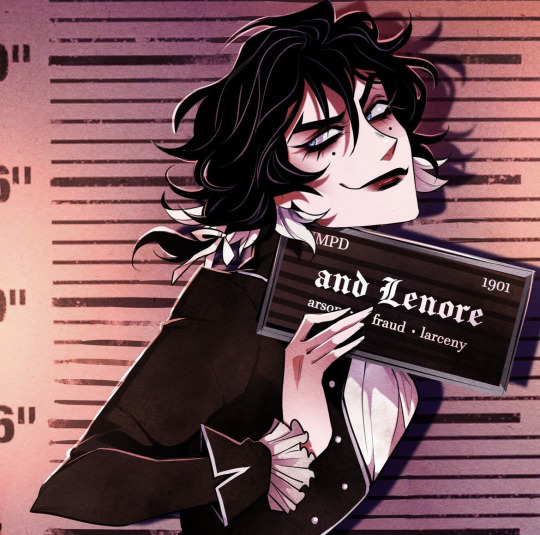
This gives us a window of roughly 5 years to work with.
Now in the Victorian era, women had their social debut at the age of 17 or 18. But given modern sensibilities, I am inclined to say she was 18.
Considering that Annabel had two social seasons before meeting Lenore, and that they meet in the last year of their life, this gives us an age gap of 3 years.
Three years to plan for how they are going meet up.
Now given the time they have to plan, instead of Annabel going to America and white raven meeting by chance, Lenore will be going to London.
#nevermore webtoon#nevermore#annabel lee nevermore#lenore nevermore#annabel lee x lenore#white raven#lennabel#annabel lee whitlock#lenore vandernacht
86 notes
·
View notes
Text
7x05 Buddie Meta "You Don't Know Me" Part 1 (of 4)
Part 2, Part 3, Part 4
Welp. I'm back at it again with the four-part metas. I was hoping this one wouldn't take too long but alas there was even more to unpack in this episode than last episode.
Fair warning my meta does contain speculation, and is very much my opinion/interpretation. I will be diving into my personal opinions about Eddie's sexuality and marriage to Shannon here. My headcanon is that Eddie is a repressed gay man, not bisexual, and I believe that while he did love Shannon, he was not in love with her and their marriage was something they were pressured into and was not healthy for either of them. I do my best to look at these topics in a nuanced light, but if you are sensitive to reading opinions that differ from yours I'm warning you of mine now. Let's begin!


Taylor Wong is nothing if not an amazing comedy writer. This call didn't end up being as psychological as I may have hoped but it still acts as an interesting parallel and metaphor. "I'm the Boss of Me!" is the tagline for a self-control conference and Buck and Eddie being the ones hurt here. How they got hurt is interesting too and reflects their exact conflicts in this episode.
Buck is being choked, stopping his ability to breathe but also his ability to talk. In the context of this episode, his inability to bring himself to tell Eddie the truth weighs on him--chokes him with guilt-- until he finally does come clean near the end, and only then is he able to exhale again. For Eddie, his being grabbed by the crotch is funny, but it's also an indicator of his storyline in this episode too. He deals with sexual dysfunction because learning about Marisol being a nun makes him feel so deeply uncomfortable that the idea of being with her sexually disgusts him and stops him from having a functioning sex life. For both of them, the pain and discomfort still linger even after the claw arm guy lets him go, but my hope is that this is indicative that one day both of them will get clarity and be set free too.

"Keeping our options open" is a call back to the last episode where Buck says he's "keeping his options fluid". Whereas the last episode it seemed to be more about sexuality, options open with men and women, this time it seems to be about something else. Maybe it's an indicator of Buck keeping his options open with different people? Which is interesting considering who pops up a second later.

This is part of why I think it's a good idea they're having Buck get used to queerness with another man other than Eddie. I feel like if Buck had discovered his queerness with Eddie, these kinds of issues might've been blown out of proportion on both of their ends and probably caused much MUCH bigger problems. Allowing Buck the chance to work through this with someone safer was a good bet.
Additionally, I find it interesting here that both Buck and Eddie are dealing with external and internal conflicts that mirror each other in this episode. In this instance, it's the fear of being Perceived. For Eddie, being perceived by God. For Buck, being perceived by Heteronormative Society at large.
This would be an adjustment for anyone, so I don't necessarily think Buck is dealing with internalized homophobia that's too detrimental. I think it's more so he needs an adjustment period and needs to figure out why he's uncomfortable. Is it the idea of being perceived as queer by others? Is it the idea of being perceived as queer by Eddie? Is it the fact that you are on a date with a man? Or is it because you're not sure if you're on a date with the right man? More on this when we get to his scene with Maddie.
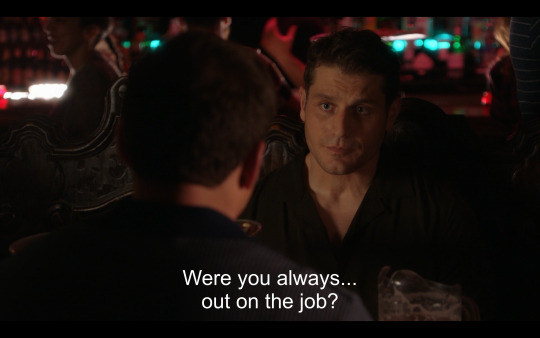
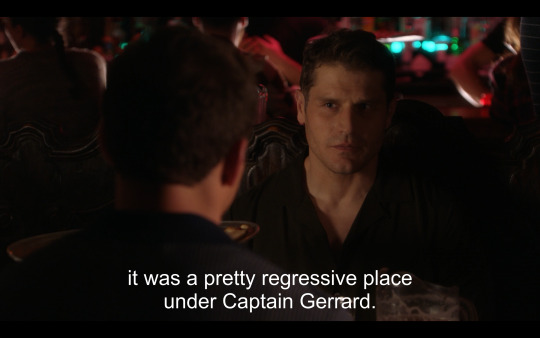
Now I had a strong feeling that Tommy was going to be someone who only figured out who he was later in life too. And it seems a lot of that was due to his past, possibly how he grew up, and being in the 118 under Gerard who was every "ist" in the book. It goes to show how far Tommy has come and also proves to be interesting if we keep thinking of Tommy as a parallel to Eddie. I also had a feeling that Tommy was going to lean slightly more toward the gay side (though he's purposefully unlabeled which is fair).
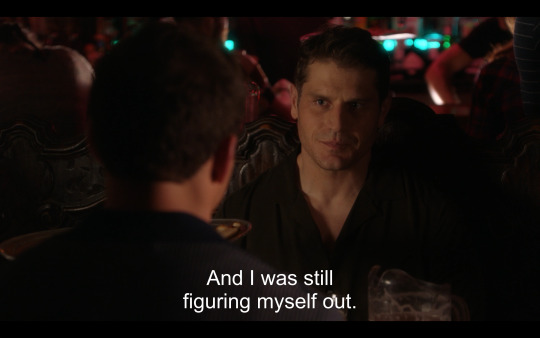
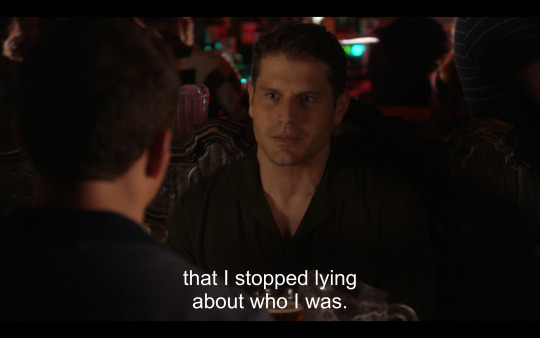
To me, the phrase "lying about who I was" seems to align more with someone who is into men and not into women, but that's just my interpretation. Especially because in the next moment, Buck says that he's not lying about how he is, which is more in line with the bisexual experience.

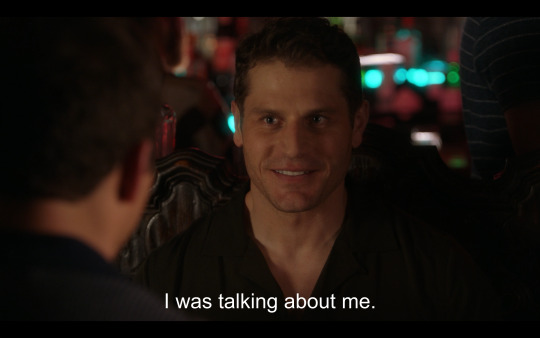
Because Buck isn't lying. He was always/still currently is attracted to women, and is only just now discovering a new aspect of himself with his attraction to men. Whereas Tommy seems to be implying that when he was with women he was lying to himself about his attraction to them. Sound like anyone else we know?
Additionally, we have another call back to 7x04 (plus a myriad of other episodes) where Buck "makes it about him" when Tommy was really just trying to tell Buck more about himself, not imply that Buck was also lying. I'm going to give Buck some grace here because this is all new for him, so I understand his hyper-sensitivity. But it is once again showing another instance of Buck failing to really connect with Tommy about something related just to Tommy. Last episode, every conversation they had always found its way back to Eddie or was about Buck's feelings regarding what was happening. This time, when Tommy tries to be vulnerable and connect with Buck, Buck makes it about him and it feels like a misconnection (like how I predicted with the missed hand grab in 7x03 with Tommy and Buck trying to connect, but something always not quite hitting the intended target).
If down the road we see Tommy's (abridged) story about "lying to himself" come to fruition in a similar light with Eddie's storyline I'm going to be delighted. Here Buck is out on a date with a man who the last episode spent the entire time telling us was extremely similar to Eddie, only to have Tommy align perfectly with a lot of our headcanons about Eddie's sexuality too. I think this is something to stick a pin in to come back to later for sure.
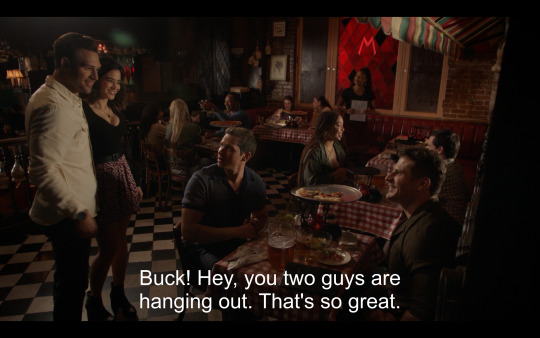
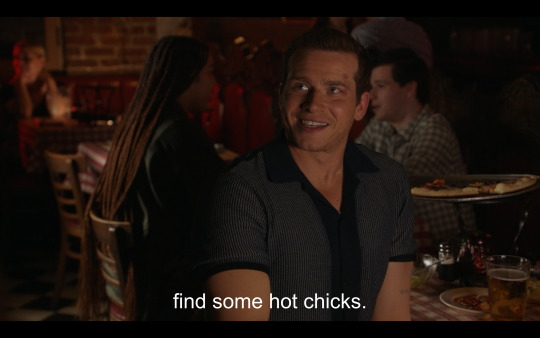
Oh, Buck. OH, baby bi Buck. My heart aches for you and my body cringes. He's obviously on edge, but Eddie showing up just makes it worse. Buck immediately tries to no homo not just himself, but Tommy as well, stating that they're going to go find some "hot chicks" to pick up. Eddie makes a face, obviously picking up on the weirdness of Buck's statement (because "picking up chicks" is wildly out of character for current Buck and has been for years) but he's too distracted with Marisol to dig any deeper into it. He believes it very easily instead of stopping to question why else these two men might be on what looks like an intimate date. Tommy looks hurt, and I feel bad for him, but this was obviously his breaking point, and I can understand why.

I want to briefly touch on Eddie and the way he was speaking about Marisol throughout the entire episode separately from the whole nun thing. I found this piece of dialogue so odd here, because in general this isn't really how Eddie talks, it doesn't feel natural for him, but at the same time, it also harkens back to some of his horrendous dialogue with Ana back in season 5. "This hot chick already found her firefighter" "Spank me with a ruler" "kinda naughty" "Grade me on a curve" "Maybe you need to keep me after class", etc.
I've always wondered why Eddie starts talking like this about or with his girlfriends. I was discussing it with my roommate and she said to her it sounded like an "8th grade boy sitting with his guy friends trying to talk up how he banged some chick when really it's just a ploy to make himself look good to the boys and like he's more sexually active than he actually is for social clout". And you know what? I think that's exactly what it is. Eddie speaking like this feels like overcompensation on so many levels (not to mention Marisol looks lowkey uncomfortable here, that smile is fake af). Trying to make himself seem way more into sex or kinky things (like roleplaying with a teacher or nun) than he actually is. The dialogue is cringey and Ryan overacts it because the audience isn't supposed to feel comfortable with it. It's not supposed to feel natural. It's not supposed to endear us to the couple, it's meant to feel out of place and wrong because Eddie being with Ana and Marisol was and is out of place and wrong. It feels like a performance to us because IT IS A PERFORMANCE.
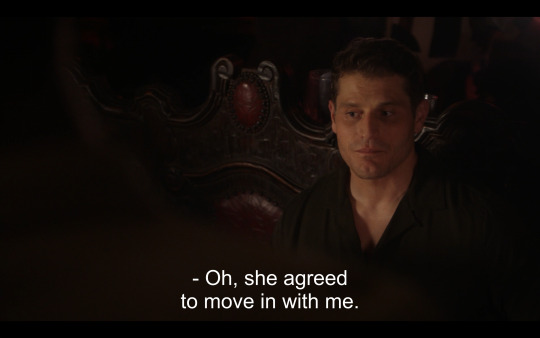

This is only enhanced by the new jarring information that Eddie has apparently asked Marisol to move in with him (offscreen). Keep in mind that they've been together for (I'm assuming) less than six months, he obviously didn't discuss it with anyone since both Tommy, Buck, and Bobby later are surprised. Christopher is also noticeably absent from this episode which leads me to believe he likely didn't really discuss it with him beforehand. This choice feels simultaneously like an OOC choice AND so very in character.
It's OOC because Eddie has stated that he doesn't like performing, he doesn't want a "ready-made family" and one would think that he would sit and contemplate this seriously given that if something goes wrong, he's providing another example of a failed relationship to his son. Not to mention that living with your parent's girlfriend is a huge thing. I've been through that process before in my own life with my mom and it's really only something you do if you're really committing to a person for the long haul because that's the message that sends to your kids.
But at the same time, this is also so severely in character for Eddie. As is pointed out later, he got married to Shannon because he was guilted into it, he dated Ana because he was pressured into it, and then overcommitted to her far too fast. And now he's doing the same thing with Marisol. This is very much a PATTERN for Eddie. Maybe, as this episode suggests, it's a facet of Catholic guilt that pushes Eddie to move way too fast in his relationships. Or maybe, Eddie finds the idea of being settled with a woman comforting, and he'd be okay sacrificing his happiness and settling with any woman as long as he got to have that comforting facade. All of this points to very obvious compulsory heterosexuality for me. More on this later.
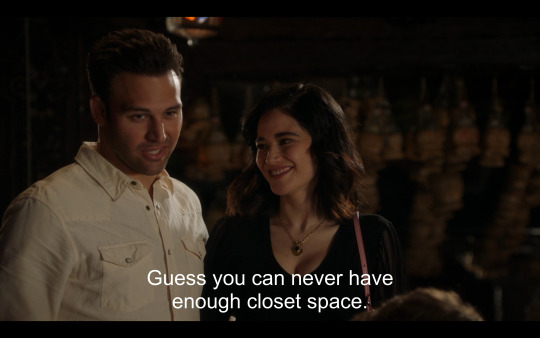
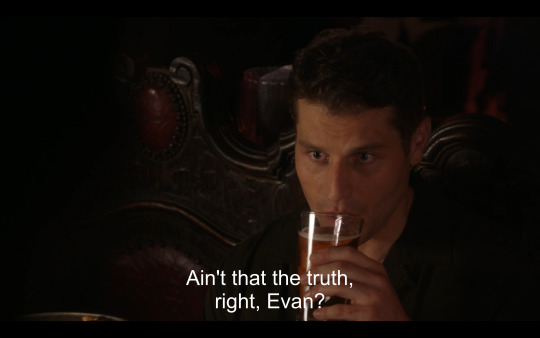

I'm going to talk more about the way the show is choosing to use physical objects, Marisol's things, as a metaphor for who Marisol is, and Eddie's willingness to receive/learn about them as a literary device later. For now, I wanna talk about the exchange of Eddie being the one to bring up "closet space", Tommy being the one to say "Aint't that the truth" and point it towards Buck, who hammers it home with his "bro" line. I find it interesting that they had Eddie say this line, when it very easily could've been Marisol (after all it is her armoire) with Tommy in the middle. Tommy (IMO) is in the center of these two men's queer realization arc. The more subtle one in the earliest stages (Eddie) and the more present one (Buck). The way all of them volleyed this dialogue felt like I was watching a choreographed play, and the lines landed perfectly.
This is also the third line in five episodes specifically poking at Eddie possibly being queer alongside Tommy and Buck. "I've never seen a man turn off a woman with such skill. it's a gift" "you both like to watch half-naked men pummel each other" and now this. "You can never have enough closet space" suggesting that not only was there Tommy in the closet in the past, Buck in the closet recently (and somewhat presently given that Buck just shoved himself and Tommy back into it), and Eddie right now still deep in that closet. Hopefully, there's enough space for all y'all!

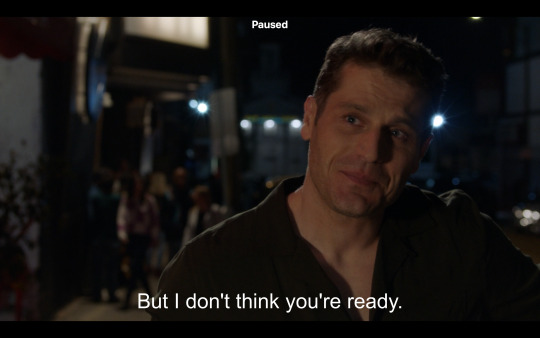
I very much liked how this went down. Tommy has a right to break things off if the person he's with clearly exhibits weirdness around being out with you. I don't blame him for his choice here. I like that he's also not making it about the fact that's he inexperienced. Additionally, I think this is another instance of Tommy witnessing something weird between Buck and Eddie, and I'm not sure how much of that he's picking up on, or if he thinks it's generally about being perceived as queer, or just needing to slow things down and process before he actually starts a relationship with a man. All are valid, but I think it's just interesting that a lot of it had to do with Eddie yet again, and I wonder how much of that Tommy is aware of.

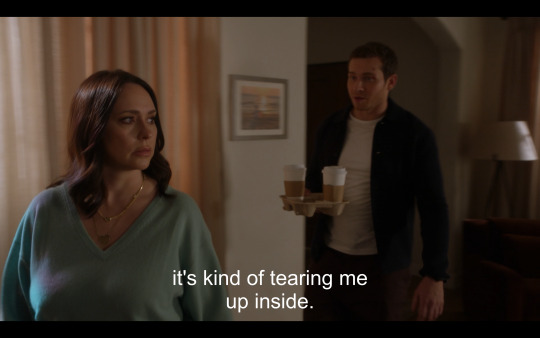
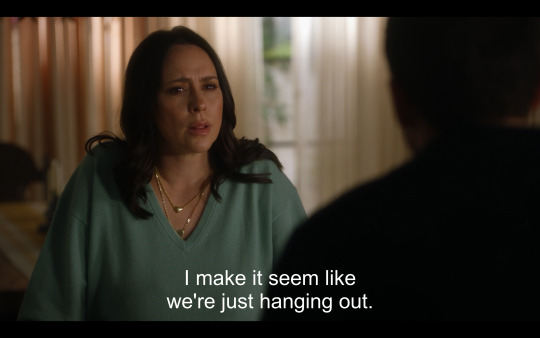
From the start of this conversation with Maddie, Buck makes it seem like the thing that's making him uncomfortable most is the fact that he lied to Eddie about the truth of his date with Tommy. Obviously, he's not going to immediately jump into telling Maddie the truth, and he's gotta start the conversation somewhere, but I do find it interesting that rather than seeking her advice on "how to get his date back" he instead is seeking advice on why he lied to Eddie and can't bring himself to tell him the truth.

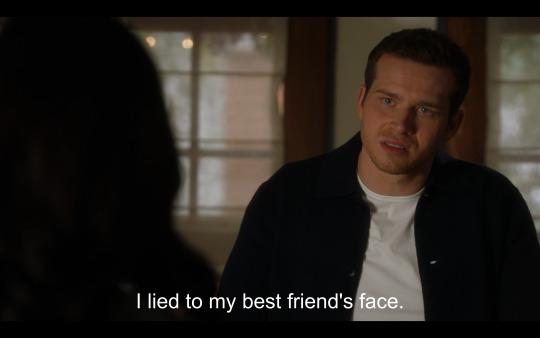
This could be deflecting because he's not yet ready to tell Maddie. Or it could be the truth that all of this angst may stem from him still trying to get comfortable in his queerness. But the main issue that isn't sitting right with his soul is that he lied to Eddie, that he's hiding a fundamental piece of the truth of who he is from Eddie. Because to Buck it is unthinkable that Eddie doesn't always know the whole truth, all of who Buck is, at all times. At this point in their relationship, they're supposed to know everything about each other, and yet something about sharing this part of himself with Eddie in particular scares him. Could it possibly be that he's aware that sometimes "straight" men get weird around their queer male friends? Could it be that he thinks his relationship with Eddie would be negatively effected if he told Eddie this truth? I will touch more on this later. But for now, Buck makes it clear that his interest isn't wholly in getting Tommy back right now. It's making sure that all is right in his relationship with Eddie.
Once again, this choice by the writers to center Eddie in every step of the way of Buck's queer realization journey is telling. Especially given that he's able to tell Maddie without ~too~ much struggle.
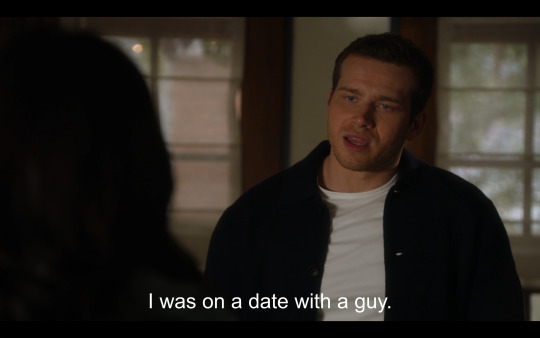
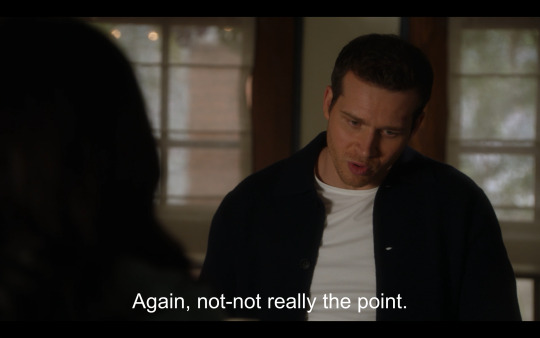
I understand where Buck is coming from. It's again distancing himself from Tommy, trying to get her advice about Eddie. But also, it's an attempt by him to normalize him going on a date with a man, which should be normal, but it's not in Buck's personal historical normal.
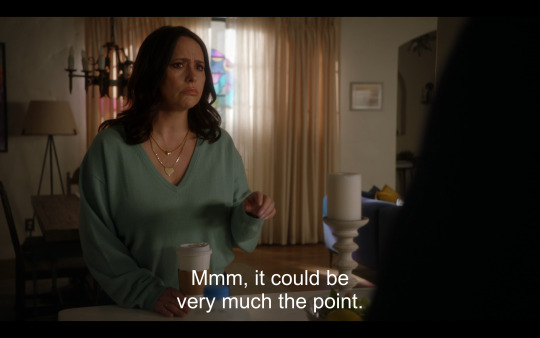
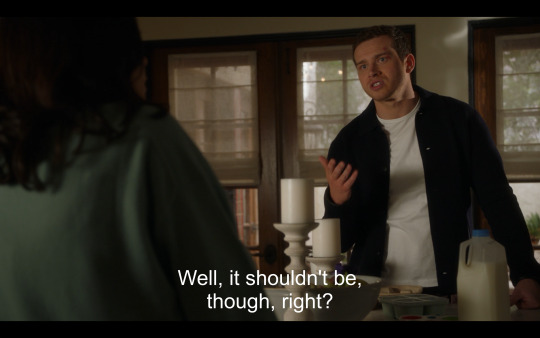
Buck wants to believe that because he was an "ally" that that means he'd just be automatically okay with dating a man right away. But I think he's trying to push himself at a speed faster than he's comfortable with (which he again does at the end by inviting Tommy to Madney's wedding) and needs to realize that he can slow down, which is a parallel with Eddie the whole episode. Which is why I think Tommy was right to step back and give him some time. The other part that is interesting is that Buck once again appears confused about the truth of his feelings, similar to the last episode and I just find it interesting in this scene where Buck and Maddie are once again talking about Eddie at her house, it's once again ambiguous if the subject Buck's really hung up on is Tommy....or Eddie. Both are true at the same time.
Go to part 2!
Part 2, Part 3, Part 4
64 notes
·
View notes
Text
¿Peter was Gwen's first love?
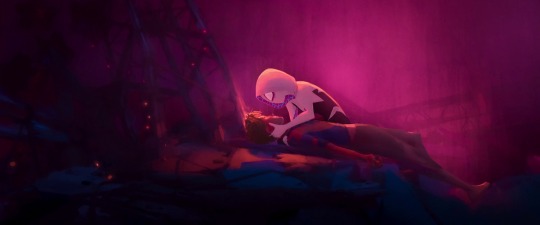
This is something I've been seeing or hinting at very recently because of certain things Gwen says in ATSV, so I wanted to go a little deeper into this topic to see if Peter was really Gwen's first love:
As everyone knows, Gwen and Peter were childhood friends until he, to being someone weak who wanted to be special just like Gwen, turns into the lizard and dies because of it. Something that is made quite clear is the fact that Peter was clearly in love with Gwen but, did she feel the same?
During the flashbacks, one can see how the two of them seem to have a genuine friendship and there actually seems to be no sign of Gwen's romantic relationship with Peter... yet
Although it is presumed that they could have gone to the high school dance as a date, I don't think so since they could easily have gone as friends and that's it.
She always makes it very clear that he was his childhood best friend, and nothing more.
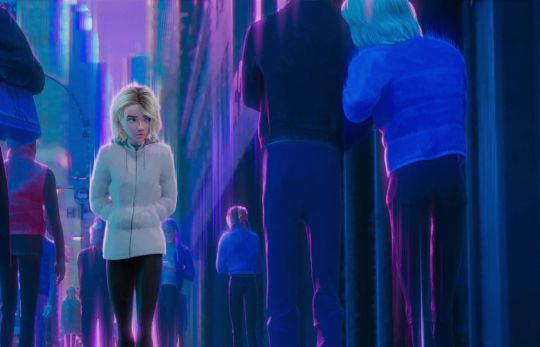
The only real clue that Gwen may have liked her friend deep down is this little scene where Gwen, after Peter's death, sees a couple holding arms and she gets upset about it.

Taking all this into account, the most logical thing is that she started to like Peter just before he died and that's where the thing stayed, it never progressed, it never evolved, nothing. It's like an uncomfortable backpack you wear on your back when you meet your soulmate.
That this would explain her unstable and impulsive personality during ITSV and the ATSV prologue that she ended up changing thanks to Miles.
Adding to which, thanks to Miles, during that time in the Spider-Society, Gwen has not only drastically improved and progressed, but she can truly get over Peter's death.
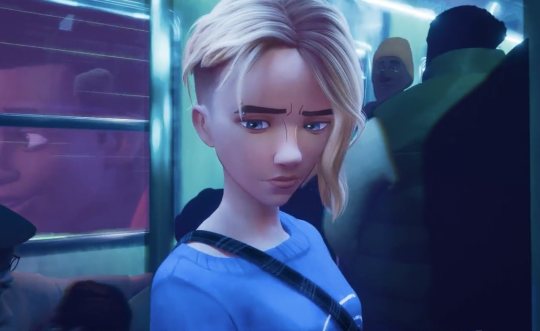
However, here is something that caused some doubt, and that is that in the ATSV prologue she mentions that, before she met Miles on Earth-1610, there was Peter, however, taking into account that at that time she was not really honest with her feelings, she was surely referring to the weight that both had in her life at that point in the story, since if we talk about friendship itself, it would make sense for Gwen to say that, but if we talk romantically, things change completely.
"Ok but Gwen refers to Miles as the first friend she's made since Peter died" Yes, it's true, but because it was Miles who wanted them to remain friends at the end of ITSV and she respected his decision, however, inside, they already liked each other since they met for the first time, and Gwen fell in love with Miles by the end of the first movie, she didn't say anything at her farewell to ITSV, so Gwen never saw Miles as a friend, she always saw him like something much more than that from the beginning, and that's, surely, the big difference from Peter.
And as a plus, she never said ANYTHING about being in love with Peter or anything like that.
Let's also remember that Gwen tries to hide her feelings in the same way that Miles does too so this should not be a surprise to anyone at this point.
We also know that Gwen refers to Miles as her "Friend" as a curtain, contradicting herself at times because she basically doesn't think things through before she says them, because the romantic feelings are painfully obvious and because also wants to go unnoticed.
Besides, she herself says at the end of ATSV that she gathered her old and, obviously, true friends to save Miles, which in itself says a lot.
More importantly, the fact that Gwen is head over heels in love with Miles and loves him so much more than he loves her, which is insane in itself, should automatically rule out any possibility of the Peter thing having any comparison, romantically speaking.
To make a comparison, Gwen barely knows Miles for 2 or 3 days and fell in love with him, something that did not happen with Peter even though they have known each other for years.
And I know that some may disagree with this, but the truth is that one can love one person much more than another and there is nothing wrong with that.
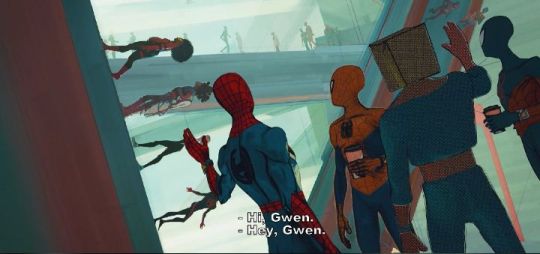
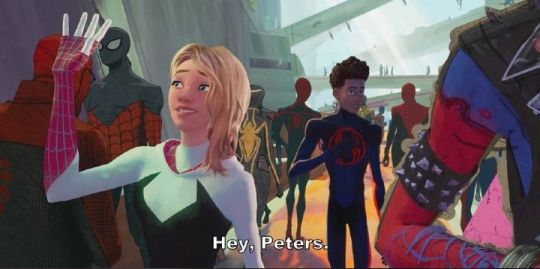
And one can also realize this when there are thousands of different Peters in the Spider-Society but she's obsessed with Miles, talking about him all that time she was there.
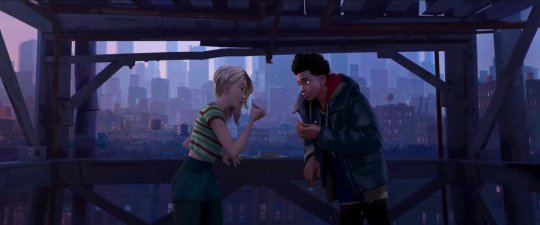
There are other clues to that, too, like when Gwen and Miles are eating on the terrace and she's surprised to realize that romantic feelings make her hungry, as if this was the first time something like this had happened to her.
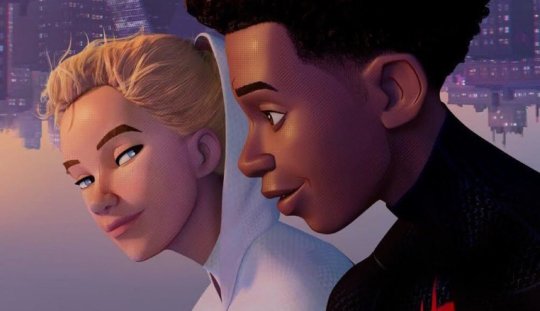
Or how affectionate, cuddly, flirtatious and playful that she is with Miles (Another big difference from Peter)
Also, the creators made it clear that Beyond The Spider-Verse will have the most satisfying conclusion to the romance between Gwen and Miles, and I can't think of a more satisfying conclusion to the relationship between Gwen and Miles than leaving that message that those little feelings that she may have developed for her dead friend would be nothing compared to what would come her way after that, and her telling Miles that he is the love of her life, being Miles the person who changed her life forever, would be the perfect climax.

In conclusion, while Gwen began to see Peter as more than just her friend shortly before he died, that's basically incomparable to all the love, care, and adoration she has for Miles, and it's grown considerably ever since the ITSV ending until the ATSV ending where, if Miles was truly in love with Gwen, she's Triple as madly in love with her soulmate. So it actually couldn't be said that Peter was Gwen's first love due to that since nothing has been developed regarding Peter, the thing remained in nothing.
I clarify that this is an analysis that I did based on what I have been collecting and researching from MY point of view, some may have a different opinion or disagree on certain things and it is perfect.
#gwen stacy#miles morales#spider gwen#peter parker#spiderverse#ghostflower#spiderman#across the spiderverse#into the spiderverse#spiderman: across the spiderverse#earth 65#gwiles
251 notes
·
View notes
Note
Hello my sunshine!
I noticed your ask box was open! I'm so happy!
Could you please do an interpretation of Mars in 11H. I have this placement. Thank you.
Have a fantastic day and a wonderful week.
Stay warm and cozy. ❤️
Hello my love, hope you're doing wonderfully. ❤️
Mars in the 11th house


Here we have natives who are more likely to rationalize when something happens that bothers them, they are not usually so impulsive when it comes to reacting and they may want to see things from different perspectives. They are very ambitious people who, once they have a plan or project that they are passionate about, dedicate themselves fully to it and not only think about it, but do something to achieve it. This placement favors those who want to start their own business, as it indicates that they can earn a lot of money working on something of their own or being their own boss. Since I mention bosses, even if they do not like to command, they have leadership skills and ensure what is fair both for themselves and for members of their group or other members of society. They are the voice of those who are marginalized or ignored and many people can feel taken into account by them. They have no problem approaching and talking to other people, in fact some tend to give the impression of being extroverted, but they highly value their time alone and doing things on their own. This is an ambivert placement.
Now talking about friendship, these natives tend to be funny, motivating and supportive friends, they have a curious way of taking care of their friends and they are not initially emotional, but rather take care of them in more practical ways. They may feel more energetic after spending time with friends or a group of people and are sometimes the person they turn to when a difficulty or problem occurs. These natives are those who tell you the truth no matter how painful it is, and honesty is something they value above all things in their friendships. They may attract more friendships with people with masculine energy, protective people, strong temperaments, or people who motivate them in some way. There may be some drama in your circles, arguments, or just having somewhat boisterous friendships. It is very likely that they prefer friends with similar ideas or perspectives in order to maintain a harmonious environment, as they stand out for defending their ideals tooth and nail. They like to defend causes linked to freedom, whether identity or expression, which is why it is a common placement for activists, feminists, people who fight for equal rights or justice for marginalized sectors of society. They have a healthy empathy in which they do not put others above them, but instead seek to understand and support them.
Although these people are open-minded when it comes to meeting many people, it is somewhat difficult for them to open up emotionally, they tend to be really defensive with their emotional world and may feel that they have to appear strong, if accompanied by other aspects of style, it can make them feel difficulty expressing their most vulnerable side. One of the good things about this placement is that they are very firm with their boundaries and do not stay in places where they are crossed or ignored. They would much rather be alone than in bad company and they have no problem with being alone at times. They seek to form friendships with more practical parameters without getting carried away by just feeling happy with the other person. They need friendships in which they feel they can trust and with whom honesty and loyalty is guaranteed, so even if they appear friendly, they remain alert and observant. In the sexual area, these natives are very open and experimental with their partner, they really like to surprise and be surprised in intimacy, and they always make sure not to fall into monotony. They don't just care about their pleasure, for them it is important that their partner also feels pleasure and feels satisfied.
#natal chart#astrology#mars#birth chart#mars in the 11th#11th house#astro observation#mars in the 11th house#mars in the 11h#mars in 11th#mars in 11h#astro note
136 notes
·
View notes
Text
i wanted to write a BIG essay on disability in House MD but the thing is that as it goes on the show plays and delves with the themes a bit differently - like in s1 they begin to introduce some addict stuff but not too much, and much less of the big grapples with house's own medical agency etc by his friends and coworkers
so i think i'm gonna do an essay series, set up some main themes around disability and autonomy in house
the first things will obviously be about the nature of house's own disability, firstly talking about his physical disability - yes, the lack of mobility from his leg and his reliance on his cane, and also the chronic pain that that comes with, but also specifically noting that house became disabled later in life and was previously extremely physically active
while the themes of house being an addict are extremely overstated because of the us' manufactured opioid crisis and its dehumanisation of addicts due to its racist and eugenicist "war on drugs", it's also noteworthy that he used to exercise all day every day on top of fucking and playing with substances on the side. no one minded this because his "addiction" to exercise was fun and sexy and healthy, bc he was making his own pain-killing substances rather than taking a pill
and then also talking about house's mental health issues - evidence of his autism and the way that people hate specifically his autistic traits, even when they're not actually causing them problems, and the way in which house masks and performs certain emotional responses, but more so like. his depression and his loss of identity as a disabled man, and his difficulties being OKAY with his disability when everyone around him hates disability
so apart from that evidence, the points of house grappling with this stuff will be:
house bonding with other disabled patients - in cases of chronic pain, lost physical mobility, and also mental illness and/or neurodivergence
and house specifically understanding disabled people's perspectives, or thinking about the PRACTICAL needs of the person they're treating or engaging with rather than what society cares about or what the hospital thinks is "appropriate" or "proper"
house bullying abled people for being Weird
times where house makes commentary about the injustice of the system (when he points out that the hospital is designed not to treat the poor, chronically sick, etc)
house being anxious and defensive of his own bodily autonomy (eg when ppl are trying to control his pain management or force him into systems that don't work, take over his medical autonomy, in general try to physically control his behaviours)
esp bc season 1 culminates in the stacy episode where we find that like... so much of house's trauma is not just being disabled
but the fact that stacy OVERRODE his desires, waiting for him to be put into a medically induced coma so that she could make "the best" decision for him and literally being the cause of his current disability. esp bc like...
she specifically went for the middle ground that he rejected, she was NOT a doctor
and in so doing she. invented his chronic pain. like there's a reason that in that same episode, we see the volleyball player who gets an amputation and is able to go back to sports - yes, house is a lot older than that volleyball player, but like
if he had either treated the infarction successfully or just got an amputation so that he could later work with a prostheses, house thinks he would have done much better
and so much of his TERROR around trusting others - not just stacy but wilson, cuddy, anybody else - is because of that. the one person he loved and trusted overrode his desires and created the hell he lives in where he's just in constant agony and he hates it, and the worst part is like
everyone tells him it's his fault. no one cares about what stacy did to him, that she manipulated him. every day they tell house how terrible it is that he does that to others, but when it's what happened to him and he lives in hell, it's on him because he's Mean and Too Autistic and he should just Stop Being In Pain etc
god it kills me.
BUT YEAH i think. season by season is gonna be a lot better to track the development of these themes and the way they shift and change from season to season - also idefk if i'll be able to stick with like. the last three seasons bc they just suck so ba dhfskjjgh
BUT WE'LL SEE
485 notes
·
View notes
Note
The show hasn't really gotten into the Breaking as much as I think they should have at this point. Which does kinda go into the fact that Lews Therin doesn't seem to be feared by the general public at least as far as we know? Which does make me a bit concerned as that is important. It does seem like the AOL flashbacks are leading up to Dragonmount and therefore the Breaking so maybe that's why it hasn't been addressed as much yet? Rafe did say there's less knowledge of the prophecies or at least less belief that they're 100% accurate since they're over 3000 years old and translated a million times so that might play a role too? Idk I'm curious for them to get into the prophecies more so we know what the world thinks and believes about the Dragon.
i just wanna say that as someone who studied ancient history and ancient literature, it is completely accurate that the current people of randland know very little about what happened 3000 years ago, that the average population outside of scholars doesn't care about what happened 3000 years ago, and that nobody is willing to put full trust in the accuracy of the few ancient texts and prophecies that survived to the present.
and mind you, i ran into all these things in my studies of events that happened only 2000 years ago. 3000 years, we are talking the late bronze age collapse in the mediterranean region - an event that's infamously mysterious precisely because we have so little surviving evidence to say what caused it.
when it comes to human history, 3000 years is a MASSIVE amount of time, and to be honest i don't think RJ/the books really understood just how massive (for example, randland should have been able to advance more, technologically, in 3000 years than it did, even considering how destructive the breaking was and how destructive the taint & false dragons & shadowspawn continued to be). the general population outside of scholars does not spend a second thinking about things that happened 3000 years ago or specific people who lived 3000 years ago. they just don't. realistically, lews therin shouldn't be anything more than a vague fable to the average population of present-day randland. of course they're not afraid of him. why would they be? he's insanely far-removed from and irrelevant to their lives - for now. i daresay they'll start to get nervous once they start to see true signs that the dragon has been reborn and that the last battle will happen in their lifetime. but until then, i cannot emphasize enough how much any dragon- & breaking-related shit is not on the general population's radar. they don't care about the bronze age collapse. they don't care about any sort of war or destruction or apocalypse until it starts to affect them personally (see: nobody caring enough to help falme in s2, just as nobody cared enough to help manetheren).
i will also add that as someone fresh from reading the books for the very first time, i can comfortably say the show is NOT lagging behind on Breaking Info-Giving compared to where the books were at this point. we had zero clue about the bore or any of that stuff until rand's rhuidean trip (and even then, i didn't really understand what the hell was going on in his visions until quite a bit later, and in large part due to learning some extra-book information that explained it better). as a show-only during s1, i can assure you that the 3000 years later flashback showing us a futuristic society made me go OH SHIT and hit home the full impact of the breaking far more than anything in the books, where we don't even see any AOL scenes onscreen aside from the rhuidean visions (which are very confusing to a first-time reader) and the dragonmount prologue (which isn't very useful since it's the first scene in the whole series and a first-time reader has zero context for anything learned there).
honestly, i think longtime readers forget just how much of our AOL/forsaken/breaking knowledge comes from extra-book sources like the companion, Word Of Jordan, etc; the books alone are very vague about so much of that stuff and i remember being repeatedly bewildered as to how you guys knew so much about the AOL when the books either didn't have those details at all or had them so vaguely that they flew right over my first-time reader head. i'm not 100% sure, but i believe latra posae decume isn't even MENTIONED in the books and comes purely from "the strike at shayol ghul", as do many of the details about the strike and the bore and the breaking. and so i definitely think the show has already included more information, and more CLEAR information, about the breaking than the books alone had by the end of TDR and in fact for much of the series.
68 notes
·
View notes
Note
Not sure if this counts, but how do you explain the ninjas ages? How are they teachers but also like 16? I always love hearing people's thoughts on this
For a while now I've been entertaining a headcanon that I think would perfectly explain this in a way that makes sense. Note that this is just a circumstantial theory with no explicit basis in canon, so feel free to take it or leave it as you see fit.
Okay, so. To understand the teacher situation (as well as my theories for why Ninjago's education system is fucked to hell and back), we first have to talk about the Serpentine War for a sec. Bare with me, I promise this will make sense.
This seems like a no-brainer, but a war requires people to actually, yknow, fight in it. Which means large demographics of people have to leave their homes, families, jobs, and communities. Naturally, this forces the ones they've left behind to compensate for the economic deficit caused by their absence. Anyone familiar with American history could tell you that this happened to the US during WWII - as swathes of men shipped off overseas to fight in the war, women back home had to take charge of the economy and participate more actively in the workforce.
I think it goes without saying that this kind of situation probably happened to Ninjago during the Serpentine War. But the thing is, we know women fought in the war stood at the front lines alongside the men - we've seen them. So if that's the case, then who stepped up to help run the economy while Mommy and Daddy were away?
I think you can guess where I'm going with this.
That's right. With so many people leaving to fight in the War (and also dying from Serpentine raids), I don't think it's unreasonable to conclude that some subset of kids and teens had to step up to the plate and take up some of the vacancies their parents had left behind. Obviously I'm not saying all the adults were gone, but it was enough to warrant kids entering the workforce prematurely.
And of course, if kids are getting jobs at younger ages, then I think it's valid to extrapolate that to teacher positions as well.
As you can imagine, this shift created a few new social precedents: 1) expectations for kids, especially teens, to get jobs and become mature at younger ages was normalized; and 2) requirements for certain careers, including education, became much more lenient.
This labor expectation imposed on older kids and teens would actually explain a lot more than just the s3 teacher situation, when you think about it.
Not only are unqualified teens allowed to become teachers, but also undead skeleton warriors from the Underworld (see s1ep4). I'm sorry, but you can't convince me that Kruncha and Nuckal are licensed educators.
The existence of Darkley's, and how it was able to exist for so long without any kind of administrative intervention. The education system is in shambles, and it's because Ninjago's infrastructure never fully recovered from the Serpentine War.
Disparities and gaps in people's historical/world knowledge. No one knows shit about anything. Because again, the education system in in shambles. (If you doubt the validity of this point, let me just remind you I'm from the US. I once met a college student who didn't know what 'north' was.)
The existence of the Paper Boys - how they can devote what seem to be entire workdays to an extremely dangerous job, with minimal adult oversight (if any).
The entirety of Ninjago society seems totally chill with the fact that their saviors are a bunch of kids. To them this isn't cause for concern or even distrust in the ninjas' capability, it's just the norm!
In s15, Lloyd was able to get a job, presumably without a high school diploma or GED of some kind. Or, yknow, any formal education past grade 3 (although we know from supplemental material that he did get some kind of tutoring from the ninja, so this point is debatable).
If some kind of in-universe CPS equivalent exists, then they certainly don't do anything. No one has ever reported or raised issue with Lloyd being homeless, Cole also being homeless for a while, the ninja not being in school, Kai and Nya being parent-free since the ages of ~6 and 3 respectively, and other such things that would ordinarily be cause for alarm.
While there is canon evidence that Kai and Nya received some degree of aid from their community, especially when they were younger, this seems to be completely absent by the time the series begins. Perhaps the community's assistance began to withdraw over time as the siblings faced increasing expectations to become self-sufficient despite still being children. Like, "you're 10 years old now, Kai, it's time for you to start pulling your weight and taking care of the shop by yourself. You need to grow up."
If we approach Ninjago's worldbuilding from this context, suddenly the teacher arc becomes less of a plothole and more...depressing, tbh.
And in a weird way, this interpretation actually fits in nicely with Ninjago's themes of generational trauma. Think about it. Society was damaged by the Serpentine War. And because they never really healed from what happened, the kids of future generations continue to face the normalization of their childhoods gradually being ripped away from them before they're ready. Kinda like kids in a broken home taking on adult responsibilities to cover the slack. Kinda like Cole handling house chores while his father grieved away from home. Kina like Kai and Nya running the shop while their parents were gone.
And everyone is just...used to it. The only times in all 15 seasons that anyone stakes a complaint about this system are in seasons 1-2 when Lloyd was a little child, in season 8 when Harumi was ridiculing the ninja, and in season 15 when Wu refused to lead the Paper Boys into battle.
(I do think it's worth noting that young children are still regarded as kids, of course, as seen with how the ninja were treated when they got de-aged. But this isn't really a refutation of my argument, as much as it is a clue to help us identify society's cutoff for childhood innocence.)
Again, it's more of a circumstantial theory than anything based in fact. So you're free to dispute it as you like. But you have to admit it would explain a lot, wouldn't it?
Anyway, that was...a lot longer than I was expecting it to be. Damn. I'm beginning to think that's gonna be a running theme with these theory posts.
Thanks for the ask! <3
109 notes
·
View notes